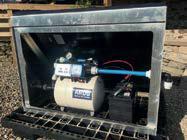












Rallies at Holyrood & Westminister plus Annual Report 2024 inside








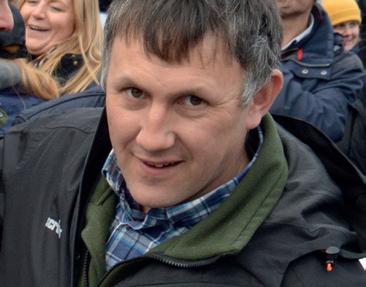






Diversify with Sykes Holiday Cottages.
Our local Property Experts are here to support you take the next steps in creating a successful and profitable holiday let business.
Farm stays generate an average annual income of £35,000.


Glamping bookings were up 67% in 2023.


In 2023, these glamping pods were booked more than 130 times.

Joint owners Gwion & Mared and Dylan & Catrin earned just over £90,000 as demand for farm stays and glamping continues to rise.
77% of Brits plan to holiday in the UK this year.


Scan the QR code or visit www.sykes.io/getstarted to download your information pack and get started. Or call 01244 617977 to see how much you can earn.
NFU Scotland, Rural Centre, West Mains
NFU Scotland, Rural Centre, West Mains Ingliston, Edinburgh EH28 8LT
Ingliston, Edinburgh EH28 8LT
NFU Scotland, Rural Centre, West Mains

OW often do you see or learn about something and think ‘I’m up for that’, but then

EH28 8LT

Tel: 0131 472 4000 www.nfus.org.uk nfuscotland @NFUStweets
Ingliston, Edinburgh

H0131 472 4000 www.nfus.org.uk nfuscotland @NFUStweets @nfuscotland
Tel: 0131 472 4000

Editor Diana McGowan editor@nfus.org.uk
www.nfus.org.uk
nfuscotland
Design & Production
Editor Diana McGowan editor@nfus.org.uk
@NFUStweets
Mark Shreeve mark.shreeve@micropress.co.uk
Managing Editor
Craig Gibson
Andrew Hirst andrew.hirst@micropress.co.uk
Advertising Sales
Design & Production
Editor Diana McGowan editor@nfus.org.uk
Ryan Swinney
Danny Lewis 01502 725862 danny.lewis@micropress.co.uk
Advertising Sales
Managing Editor
Craig Gibson
Lawrence Kenny 01502 725860 lawrence.kenny@micropress.co.uk
Clare Stebbing clare@connect communications.co.uk
Design & Production
Tel: 0131 561 0024
Ryan Swinney
Advertising Sales
Clare Stebbing
Published on behalf of NFU Scotland by Connect Publications (Scotland) Ltd.
Published on behalf of NFU Scotland by COUNTRYWIDE PUBLICATIONS
clare@connect communications.co.uk
Studio 2001, Mile End, 12 Seedhill Road, Paisley PA1 1JS
Tel: 0131 561 0024
Fountain Way, Reydon Business Park, Reydon, Suffolk IP18 6SZ 01502 725800
Printed by MICROPRESS PRINTERS LTD
Fountain Way, Reydon Business Park, Reydon, Suffolk IP18 6SZ 01502 725800
Published on behalf of NFU Scotland by Connect Publications (Scotland) Ltd.
Studio 2001, Mile End, 12 Seedhill Road, Paisley PA1 1JS

HOW often do you see or learn about something and think ‘I’m up for that’, but then never actually realise that positive thought/ silent commitment? Possibly too

positive thought/ silent commitment? Possibly too often or not at all.
In this month’s magazine, our two features cover inspiring stories and highlight just how rewarding delivering on such thoughts can be both for the individual involved and others who may benefit along the way.
IWe’re only a few weeks away from the Royal Highland Show. Over the course of four days, thousands will flock to the show to compete, judge, exhibit, organise, educate and socialise. We’ll see the best of the best and relish the atmosphere. Among the highlights and away from the main show ring, this year will see the welcome return of the Golden Shears Sheep Shearing and Woolhandling World Championships. Taking place at the MacRobert Theatre, the 2023 Worlds will see more than 30 countries compete for the prestigious title and it promises to be an action packed showcase of the art, skill and techniques required to be a world champion.
Diana McGowan
In this month’s magazine, our two features cover inspiring stories and highlight just how rewarding delivering on such thoughts can be both for the individual involved and others who may benefit along the way.
t has, as you will see from the contents of this issue, been an extremely busy past six weeks. We report on a full Autumn Conference, our presence at this year’s AgriScot, and on rallies in London and Edinburgh – all that on top of the ‘day job’ and much more. We have kept you informed of news and NFU Scotland activity along the way but there has also been widespread broadcast, print and digital media coverage at local, regional and national levels. It was quite a challenge trying to pack as much as possible into this edition.
As we race towards the end of 2024, it is a time when we take a look back at NFU Scotland’s activities and summarise the key moments and successes of the year in our 2024 Annual Report which can be found on pages 19-34. It’s always humbling to pause and refl ect on the power, volume and scope of work NFU Scotland does on behalf of you the members, and in turn, the wider Scottish Agricultural sector, over a twelve-month period.
Perhaps a less well known event taking place at this year’s Highland is the final qualifying round of the 2023 Britain’s Fittest Farmer competition. Taking part in this event for the first time is Kyla Graham from Kirkcudbrightshire. Kyla first spotted the event at the Show last year and while watching it thought ‘I’m up for that’. Kyla knew however she couldn’t just enter there and then. Like any competition, she understood you need to be ready for it and without knowing if she would even enjoy it, she set her mind to it to finding out if she would. Kyla shares her journey from that moment to the present and highlights how she’s benefited already in so many ways both mentally and physically, and explains about the positive impact her preparation has had on her working life.
It continues to be a privilege to shine a spotlight each month on some of the different topics, issues, innovations and opportunities within the sector. Finding inspiring individuals to help inform others of their experience and be my ‘featured guest’ month by month has never been diffi cult. There are oodles of you to reach out to and I thank you all for being willing to share your tales - I know from the feedback received, that others within the organisation and beyond, have loved reading and learning from you. Thank you. I am already looking forward to getting out and about to report more in the year ahead.
The other feature looks at how a casual conversation during a Christmas lunch turned into the most rewarding and humbling experience for Next Generation Chair, Matthew Steel, one of the many volunteers who have recently delivered much needed 4x4 vehicles to Ukraine to support the war effort. Matthew explains his contribution to the ‘Pickups for Peace’ campaign and reflects on how the unexpected reception received from the Ukrainians has impacted him and those who were involved.
For me, one of the many highlights of this year was defi nitely the Royal Highland Show. It’s such a busy event with lots of work to be done but at the same time, a brilliant occasion to catch up with so many NFU Scotland members on our stand.
We’re only a few weeks away from the Royal Highland Show. Over the course of four days, thousands will flock to the show to compete, judge, exhibit, organise, educate and socialise. We’ll see the best of the best and relish the atmosphere. Among the highlights and away from the main show ring, this year will see the welcome return of the Golden Shears Sheep Shearing and Woolhandling World Championships. Taking place at the MacRobert Theatre, the 2023 Worlds will see more than 30 countries compete for the prestigious title and it promises to be an action packed showcase of the art, skill and techniques required to be a world champion.
Another big event each year, is the NFU Scotland annual conference, dinner and AGM in February. The organising team are beavering away behind the scenes preparing for the February 2025 event – see page 17 for information and keep an eye out for more details being revealed as we get closer to the date. At what will be Martin Kennedy’s last conference as President and with the elections of the new Presidential team (see pages 13-15 for candidates) taking place, tickets for the packed two-day conference and dinner will be in demand. Book early to avoid disappointment (instructions will be posted online).
Have a wonderful festive season.
Perhaps a less well known event taking place at this year’s Highland is the final qualifying round of the 2023 Britain’s Fittest Farmer competition. Taking part in this event for the first time is Kyla Graham from Kirkcudbrightshire. Kyla first spotted the event at the Show last year and while watching it thought ‘I’m up for that’. Kyla knew however she couldn’t just enter there and then. Like any competition, she
Finally, as we head towards the longest day, with the hope of some warmer weather on the horizon, I hope you’re remembering to dress for the weather and wear protective sunscreen and hat when you’re out and about. The strength of the sun even on a dull day can prove harmful if exposed without protection. If you need a new baseball cap, visit the NFU Scotland website and purchase one from the branded merchandise in the Members’ Benefits section.
“We’ll see the best of the best and relish the atmosphere”
The other feature looks at how a casual conversation during a Christmas lunch turned into the most rewarding and humbling experience for Next Generation Chair, Matthew Steel, one of the many volunteers who have recently delivered much needed 4x4 vehicles to Ukraine to support the war effort. Matthew explains his contribution to the ‘Pickups for Peace’ campaign and reflects on how the unexpected reception received from the Ukrainians has impacted him and those who were involved. Finally, as we head towards the longest day, with the hope of some warmer weather on the horizon, I hope you’re remembering to dress for the weather and wear protective sunscreen and hat when you’re out and about. The strength of
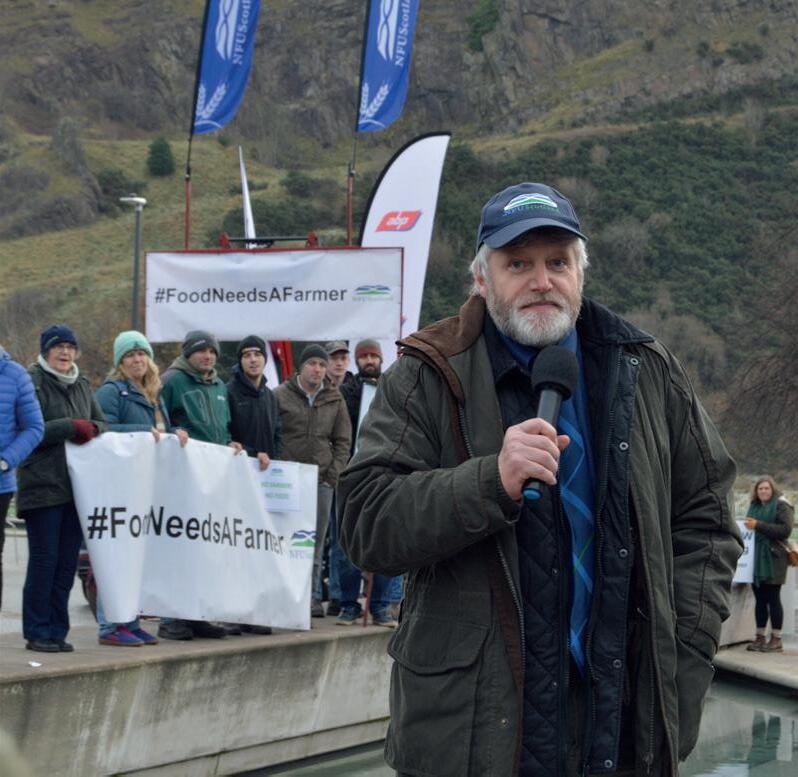
Last month I highlighted that we were all waiting in anticipation for the oncoming budgets, both from Westminster and Holyrood. This was also highlighted at great length at our full-house Autumn conference at the end of October and directly to the First Minister at our packed seminar at AgriScot.
of our own MPs including the Secretary of State for Scotland Ian Murray MP, was the immediate reaction which was kept at the
top of headlines in the press. This was alongside a mass rally held in Whitehall that many thousands attended to show their serious discontent at the decisions that put farming families under serious pressure.
I sincerely hope the UK Government takes another look at these decisions and at least consults with the industry before this goes anywhere near primary legislation, or further action from the industry will be inevitable.
Of course, the poor decisions taken didn’t only involve taxation, what is every bit concerning is the decision to discontinue an over 50-year-old safety net of ring-fenced funding for agriculture. Yes, despite this new Labour Government’s rhetoric of food security being national security, they have now washed their hands of protecting the budget for agriculture and left it entirely within the powers of the devolved Governments to support agriculture as it sees fit through the block grant.
Let’s hope the staggering turnout at our rally outside Holyrood has sent our funding asks loud and clear to the Scottish

Keep up to date with all the news on Facebook or follow us on @martinkennedyvp and @NFUStweets

For the weekly news sent to your email, please send your name and membership number to info@nfus.org.uk
With one budget down (UK) and one to go (at time of print), I certainly never dreamt that this new Labour Government would treat agriculture with such contempt at its fi rst attempt at a budget. The decisions taken with Agricultural Property Relief (APR) and Business Property Relief (BPR) alongside other taxation issues pulled the rug from under our industry’s feet. My father always used to say to me that farming would fair pretty well under a Labour Government but the actions and decisions of Rachel Reeves on her maiden budget on 30 October blew that completely out of the water.
I have never known our sector to react with such unity right across the devolved nations. The mass lobby in London where many of us attended to speak to over 30
I have never known our sector to react with such unity right across the devolved nations.

Government and Parliament.
I would like to thank all of you for supporting us in taking our clear messages about funding and taxation to the decision makers at Holyrood and Westminster, for writing in volume to your MPs, answering media calls and for signing the NFU petition. Your powerful messages and voices will be hard to ignore.
This issue is away to design ahead of the Scottish Government’s budget but we’ll certainly be reporting on it and our follow up actions in the next issue and through our member communications.




























































IAndrew Connon Vice-President (overseeing Food & Farming Policy)
t’s been a hectic month including; rallies at Holyrood and Westminster, National Committee Meeting, a very well attended Webinar on the Beef Calf Scheme and a meeting of the Scottish VI which now has an even greater role to play as we try to retain access to various chemicals for our tool kit in order to maintain effi cient, competitive production. I had the privilege of speaking at the MAGB Annual Lunch in London where I highlighted all the concerns and asks of our arable sector including; the need for a Premium Price to be paid for a Premium Product, discussing green credentials and the fi nancial value in that, the competition for land use and also a hard hitting comment on the continued importing of wheat by certain distillers with little assurance or quality credentials. On this it’s apparent that some growers are voting with their feet and supporting merchants that are supporting them! Discussions




IAlasdair Macnab
Vice-President
(overseeing
Climate, Land & Business Policy)
write this in late November whilst taking stock of the issues from the recent UK budget.
In February this year, the now Minister for Food Security and Rural Aff airs, Daniel Zeichner MP, publicly declared concern about spaces on supermarket shelves and the need for food security. Eight months later,


are ongoing. A similar message was delivered at an SWA/Distillers round table meeting. A rewarding round of AGMs including Bute, Mull, Kintyre, Aberdeen, North East, Fife, Balfron and Monteith, and Caithness – great engagement and some tremendous farm visits. Finished cattle prices are at record
levels, sheep remain fi rm, pigs and poultry demand is good, milk is fi rming whilst fresh produce and potato prices are strong – all needed however veg yields are suff ering due to the weather. Hopefully the New Year will bring some cheer to the combinable crops sector. All the best for the festive season and 2025!
without consultation, the UK Government announced, without consultation or notice, proposals for inheritance tax, and a revised block grant to the Scottish Government that includes an un-ringfenced allocation for Scottish Agriculture funding.
Industry reaction was reflected by the scale of participation in the recent NFU organised mass lobbying event in Westminster and separately organised march outside. Our rally at Holyrood ahead of the Scottish Government’s budget, provided another opportunity for the Scottish industry to unite and make our case for securing funding for Scottish Agriculture.
Elsewhere, within my Union remit, I chaired a session at our Autumn Conference with Professor John Gilliland explaining how grazing cattle are being recognised as a significant player in carbon sequestration and Cora Cooper presenting their farm peatland restoration work and observing how food production is the trigger for nature.
The new Agriculture Supply Chain Adjudicator visited AgriScot where Tracey Roan and I introduced him to key dairy

supply chain players in Scotland
Lobbying MSPs on the Land Reform Bill, pushing for quicker action on solutions for bracken control, a peatland webinar, muirburn, branch meetings and work on the Scottish Biodiversity Strategy are just some of the issues I’m dealing with currently.



















Please note, the NFU Scotland Head Office will be closed over Christmas and New Year from midday Tuesday 24 December to Friday 3 January inclusive.




Awidespread consumer survey conducted on behalf of NFU Scotland concluded that the current regulations, policy, and practice in relation to labelling of food products sold across the UK is confusing, vague and often misleading, creating a complete lack of transparency for consumers. The results of the survey into public attitudes towards food labelling, undertaken by Edinburgh-based market research specialists Diffley Partnership, were presented by Mark Diffley to the Union’s Autumn Conference. The company conducted 1,744 interviews: a nationally representative sample of 1,140 UK residents and a nationally representative boost sample of 604 residents of Scotland.
Commenting on the results, John Davidson said: “Consumers are entitled to know the origin of the food they are buying to help them make informed choices. Our findings support a radical overhaul – led by Governments but also embraced by retailers – of the regulatory framework governing the rules around food labelling and we call on all Governments to act.”
aintaining strong relationships in our supply chain that are built on trust, engagement, and feedback is essential, particularly as we face major challenges and opportunities in Scotland’s agricultural and malting barley industries was the focus of a recent blog by VicePresident Andrew Connon posted on the Union’s website and keynote speech he gave at the Maltsters Association of Great Britain’s annual luncheon, held in the prestigious Armourers and Brasiers’ Hall in London. Andrew said: “It is vital that Scottish agriculture remains profi table and competitive. Malting barley is a premium product and should command a premium price.
“Yet, as rising land costs put pressure on cropping decisions, financial incentives must reflect the quality, sustainability, and local value of Scottish barley production.
“Consistent investment in machinery, technology and environmental initiatives requires reliable returns. This winter’s contract negotiations should recognise this value and seek to reward Scottish growers appropriately, especially given rising costs and global market challenges.”
Building on existing relationships, to the benefi t of all parts of the chain, is key.
You can read more about what Andrew said by visiting nfus.org.uk and clicking on the associate Blog from the homepage.

Anew online learning course aiming to raise awareness of diversity, equity and inclusion (DEI) issues in UK agriculture has been launched by Nuffield Farming Scholarships, sponsored by McDonald’s and The School of Sustainable Food & Farming at Harper Adams University. The programme is also being supported by AHDB and the Frank Parkinson Agricultural Trust.
Agriculture is one of the least diverse industries in the United Kingdom, including ethnicity, disability, and sexual orientation and especially in leadership and management roles. This presents a series of challenges for the industry, most notably when it comes to recruitment and relations with the wider public.
One barrier to welcoming more diverse people is
a lack of awareness among those in the industry in how to relate to and communicate with people from different backgrounds.
There are many people in the rural sectors who might want to reach out but may not know where to start or are afraid of causing offense accidentally. Additionally, new entrants or students from under-represented groups may feel nervous about choosing a farm or other business for work placements.
AgDiversity is a bespoke course created specifically for those involved in agricultural, rural and land-based industries. It is open to anyone wishing to learn more about DEI for a fee of £30.00 – the lowest cost of any openly available course of its kind.
To learn more and access AgDiversity, please visit www.nuffieldscholar.org/agdiversity or scan the QR code. For inquiries about group bookings, please contact info@nuffieldscholar.org.
The Farmers’ Choir is set to make its north-east debut on 22 February at 7.30pm ANM Group’s Thainstone Centre, Inverurie, AB51 5XZ.
Hosted by Perthshire farmer and comedian Jim Smith, the event will feature around 80 of The Farmers’ Choir’s wonderful singers who are set to raise the roof at Thainstone, performing a selection of much-loved songs from well-known musicals.
Building on the success of their outstanding performance in Perth earlier this year, the Choir will be taking to the stage to help raise funds for RSABI and, in support of the charity’s #KeepTalking campaign, the

concert aims to remind people of the importance of reconnecting and looking out for each other.
Choirmaster Kate Picken MBE said the choir was very much looking forward to making the trip to Aberdeenshire which will be their furthest north concert in a decade of performances.
Tickets are priced at £25 each with all profi ts being donated to RSABI and are available to buy online via www.rsabi.org.uk . Song sponsorship opportunities are also available and RSABI would be delighted to hear from anyone who would like more information via rsabi@rsabi.org.uk

We were delighted to support the Scottish Agriculture Awards on 24 October, as over 500 attendees gathered to celebrate the sector’s most innovative and forward-thinking businesses and individuals. Organised by AgriScot, RHASS (the Royal Highland & Agricultural Society of Scotland), and The Scottish Farmer, the ceremony in Glasgow celebrated achievements across 17 prestigious categories. NFU Scotland was proud to sponsor the Farming’s Future Award, a new addition to the event for 2024 aimed at recognising talent in
the next generation. For his outstanding commitment to innovation in his business and wider industry contributions, this award went to a well-deserving James Hamilton from Forth and Clyde.
Along with Thorntons Solicitors, we also supported the Mixed Farm of the Year Award which was another new addition to the 2024 programme. Robert Forrest Ltd, a family-run beef, sheep and arable business, claimed this accolade.
We send our congratulations to all winners and nominees from the eventthe judging panel will have had difficult deliberations.

During a chance encounter with NFU Scotland member,
William Downie at this year’s Royal Highland Show, Will mentioned he had liked the ski chair my family had made me for Christmas a few years ago and I (Diana McGowan) had written about in my Editor’s column. He said he had a ‘ski bike’ he had at home. Will has now shared a photo of this bike which in my opinion while creative needs a very bold and brave person to test it out.


But according to Will it’s great fun and very useable. He said; “On a snowy day on our sledging fi eld, the children would bike/ski down the hill and get pulled back up again with a length of rope tied to a quad bike. It provided hours of fun for all the family.”




Congratulations to the winners of the October magazine’s reader off er. We had two sets of Infantino ‘Farmers Market’ trio of tasty teethers to give away. The lucky winners were Alex Ross from Stornoway and Sandra Ferguson from Whithorn. Pictured here is a photo of Sandra’s granddaughter Sophie Ferguson looking very interested in her new present from Granny.
Thanks again to BumpPR for their support and providing the teething sets.













The potatoes sector is to benefi t from the delivery of seven industry projects funded by residual levy reserves, after a grant agreement was signed between the Agriculture and Horticulture Development Board (AHDB) and GB Potatoes. The seven proposed projects are on Potato Blight; Aphid Monitoring Project; Management Tools to tackle Viruses; Reputational Management; Bridging Information Gap Project; CIPC Residue Monitoring; Updating Nutrient Management. Letters of support for the funding of the seven projects were received from industry bodies including NFU Scotland.

With many farming and crofting families worrying about the cost of heating their homes this winter, RSABI is reminding the agricultural community about its ‘Help for Heating’ grants which have increased to £400 this year. Rural properties can often be older and more challenging to heat and with changes to the Winter Fuel Payment alongside rising energy costs and the on-going cost-of-living crisis, many are facing mounting financial pressure. The application process is straight forward, and RSABI would encourage people working in, or retired from, agriculture who are struggling with costs and spending more than 10% of their household income on heating costs to contact them on 0808 1234 555.





















(in alphabetical order)
On Friday 7 February, NFU Scotland’s Council members will elect a new President, who will succeed outgoing Martin Kennedy who has held office for four years, the maximum term allowed under the Union’s constitution. At this time the Council will also elect two Vice-Presidents. There are two nominations for the position of President and three for the two Vice-President roles.

Andrew farms in partnership near Ellon in Aberdeenshire on 370 acres where the main enterprises involve finishing cattle, breeding and finishing sheep, and spring barley. He is married to, and ably assisted by, Pauline, whilst son Andrew and daughter Sarah in addition to helping at home, work on neighbouring farms.
After graduating from Aberdeen University with an Honour’s degree in General Agriculture, he joined Velcourt as a trainee farm manager in South East England before returning to a farm management position in Aberdeenshire.
Andrew then embarked on a commercial career in agricultural finance with NWS Bank and then JCB Finance. In 1999 he joined the family-owned machinery business of A M Phillip initially as a Branch Manager before becoming a director and then Dealer Principal until the business was sold in 2018. He then worked with the Online Market Places – SellMyLivestock and Graindex for 4 years. Currently Andrew does some landowner engagement work for a local company.
He is a long-standing member of NFU Scotland New Deer Branch and a former Branch Chair. He represented the North East Regional Board for several years, elected ViceChair (2017) and Chair (2020).
In February 2021, Andrew was elected NFU Scotland Vice-President. He was re-elected in February 2023 and was unchallenged in February 2024. He currently sits on the Food and Farming Team Committees: Livestock, Milk, Pigs, Poultry, Combinable Crops, Potatoes, and Horticulture. He has also sat on the Finance Committee since elected in February 2021.

Alasdair Macnab farms at Kildun, Dingwall with his wife Gill, running the well-known Alagils pedigree Limousin herd, growing malting barley and hay. Alasdair went to Dingwall Academy and then Glasgow University graduating in veterinary medicine. He worked in a vet practice in Ross-shire for 11 years, then joined the government vet service in Inverness. Working across Britain for 25 years gaining extensive experience in animal welfare, BSE, TB, and the Swine Fever and Foot and Mouth outbreaks, disease outbreak management, data management, import and export, pigs, poultry, transport of livestock, crofting and publishing research. He now farms and runs a consultancy advising farmers in legal disputes.
His farming career started on his late uncle’s dairy farm at Humberston, Dingwall (now Dingwall Auction Mart) working with dairy, sheep and cereals. He was a crofter breeding cattle and sheep near Strathpeffer for over ten years before buying Kildun from his mother in 2005. On Kildun, Alasdair and Gill have developed some high value nature sites to integrate into the farm system and are currently working on a nature restoration project for salmon and trout.
Alasdair has built several houses, run a timber reclamation and flooring business, is a past RHET Highland Chair and is currently a trustee at the Ross County Foundation, a community charity linked to Ross County Football Club where he is also a season ticket holder.
Alasdair has been a member of NFU Scotland for over thirty years. On leaving government service, he took on the role of Vice-Chair for Black Isle and Mid Ross Branch in 2016, becoming Chair in 2017 and representing Highland Region on the Legal & Technical Committee. He took on Legal and Technical Committee Chair in February 2022 and was elected NFU Scotland Vice-President in February 2023.
In the role of Vice-President, he has had oversight of most of the commodity committees and now leads on the Climate Land and Business policy areas. This includes the committees for Next Generation, Less Favoured Areas, Environment and Land Use, Legal and Technical, and Crofting, Highlands and Islands.
(in alphabetical order)



Mike is a first-generation farmer. He farms in the Insch and Oldmeldrum areas with his wife Bridie, growing crops on 220 acres of grade 3 land, based predominantly on a wheat/oats rotation. He is not from a farming family but knew that he wanted to make a career in Agriculture. After school he chose to study Agricultural Biochemistry at Newcastle University from which he graduated having undertaken an honours project on meat quality in pigs. Whilst at Newcastle he worked on the University pig unit at Cockle Park.
He then progressed to Aberdeen University to complete a PhD in beef cow nutrition followed by a return to Newcastle University for a post-doctoral position investigating the use of rapeseed meal in pig diets.
Mike then moved to Scotland to work for SAC as a poultry advisor at Craibstone.
In 1990 Mike and Bridie bought West Knockenbaird, Insch, using every bit of cash they could scrape together, built a small broiler unit, and grew from there.
Mike resigned from SAC and joined Grampian Police in 1992, a steady income and shift pattern allowing them to develop the farm and build a house where they raised three children. It was hard on both of them, Mike working two jobs and Bridie raising the family whilst working on the broiler unit. This period of adversity was invaluable, instilling resilience and a strong work ethic.
Over the following years the business developed including a few years when they had suckler cows which made no money but did leave Mike with a great respect for his neighbours and friends for whom ruminant livestock were the main enterprise. When the broiler industry changed with the closure of the Aberdeenshire processing factories a strategic decision was made to end broiler production and build an 800kW wind turbine. This was a successful move ultimately allowing the purchase of additional land, and elimination of debt.
Mike is pragmatic and practical with an ability to see through the “clutter” to grasp the salient points of regulation. He has been an NFUS member for 13 years and for the last three years has sat on the North East Regional Board as the Renewables Co-ordinator.
Of particular concern to Mike is the dire lack of opportunity for young people to enter the industry as returns from activity are low, land and machinery expensive and tenancies rare.
Duncan farms a 2000-acre mixed LFA livestock coastal farm in Glenbarr on the west coast of the Kintyre peninsula. He is supported by his wife, Fiona, their four children Eilidh, Neil, Cameron and Robbie and their grandson, Finlay. Eilidh and Robbie help on the farm working alongside the loyal team that is Ian, George and Tommy.
The family farm 160 native cross suckler cows and 600 llyen cross breeding ewes. The farm has a self-contained flock and herd, buying only bulls and tups. 90% of the stock is sold dead weight, with lambs fattened on brassicas and cattle finished on silage and barley. They grow 125 acres of barley for their own consumption. The farm has a 7.5 mega watt Community Wind Farm as well as 600 acres of forestry.
After leaving school in 1981 Duncan travelled to North Wales, for his pre-college year, where he worked on a dairy farm milking twice a day. College was Craibstone in Aberdeen completing his DA with a practical placement on a cropping unit in Forres.
He then spent 18 months in New Zealand and Australia working on livestock units before returning to Aberdeen to achieve his DipFBOM.
From there a sheep and pig fattening unit in North Yorkshire before a move to Hawick as a stockman on a mixed livestock farm. Two years later a move to Melrose where Duncan was farm manager on a mixed arable farm.
In 1993 Duncan returned to Glenbarr to take over the family farm which was significantly in debt. After major restructuring and an openness to explore diversification projects, such as tree planting and renewable energy, the business is now in a more stable, financial position.
Duncan is the former QMS Kintyre Monitor Farmer. The experience introduced better herd management with rotational grazing and EID recording, soil management with regular soil analysis and easy care sheep to the area.
Within NFUS he has served two years on the Livestock Committee, eight years as Kintyre Branch chair and for the last fi ve years Argyll and the Isles Regional Chair with a place on the NFUS Board. During this time Duncan worked with the Rest and Be Thankful pressure group and had extensive negotiations with SEPA in a bid to resolve ongoing slurry storage issues.
When not working Duncan enjoys visiting new places and supporting the Scotland rugby team.
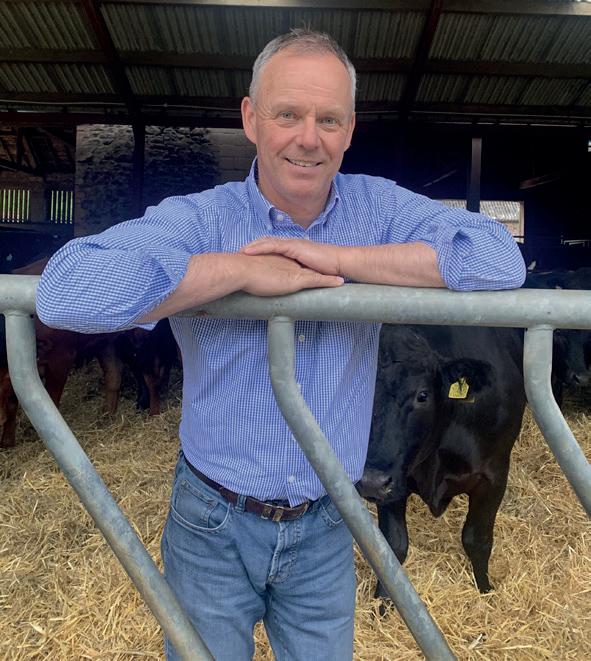
Robert is a tenant farmer on Lothian Estate in the Scottish Borders and farms with his wife, Jacqueline, and two sons Andrew and Harry. Upper Nisbet Farm along with the neighbouring farms of Ploughlands and Ormiston Mains, covers an area of 1,700 acres growing 1,000 acres of cereals. They also run 350 suckler cows and are finishing all progeny on home-grown forage and cereals.
He has experience working with several organisations including Chair of the South of Scotland and Border Valuers’ Association; Chair of the Borders Crop and Grassland Competition; Board member of RHET Scottish Borders Countryside Initiative; Chair of the Kelso & St Boswells branch of NFU Scotland. He is in his second term representing the Lothians and Borders on the NFU Scotland National Livestock Committee and is Vice-Chair of the Lothian and Borders Region of NFU Scotland. In 2013 he was awarded a Nuffield Scholarship and he undertook an overseas tour to study Electronic Identification in the Cattle Industry. The knowledge acquired through his Nuffield Study led to him being part of the Scottish Bovine EID Stakeholders group.
Robert has also been a Director of AgriScot for the past 10 years and is the current Chair, a position he has held for seven years.
See below details of when/where Regional Hustings events will take place ahead and where you can hear from and question all candidates ahead of the elections in February.
Wednesday 8 January East Central St Johnstone FC, McDiarmid Park, Crieff Road, Perth PH1 2SJ. 7pm
Thursday 9 January Ayrshire Ayrshire Food Hub, Crossroads, Kilmarnock, KA1 5JQ.
7.30pm
Friday 10 January Argyll and Islands The Gather, Campbeltown Road, Tarbert, PA29 6SX. 1.30pm
Monday 13 January Highland Dingwall Market, Bailechaul road, Dingwall IV15 9TP. 7.00pm
Tuesday 14 January Forth & Clyde The Garfield Hotel, Cumbernauld Road, Stepps, G33 6HW. 7.30pm
Wednesday 15 January North East Lochter, Oldmeldrum, Inverurie, AB51 0DZ. 7.00pm
Thursday 16 January Dumfries and Galloway Market Inn Hotel, 7 Queen Street, Castle Douglas, DG7 1HX. 7.30pm
Monday 20 January Lothian and Borders Carfraemill Hotel, Lauder, TD2 6RA. 7.00pm
Tuesday 21 January Shetland Shetland Marts, Lerwick, ZE1 0NA. 7.30pm
Wednesday 22 January Orkney
Albert Hotel, Kirkwall, KW15 1JZ.
7.30pm































FEBRUARY 6-7

NFU Scotland’s National Conference, Annual Dinner and Conference is taking place at the Radison Blu Hotel in Glasgow city centre on Thursday 6 and Friday 7 February 2025 for what promises to be two packed days filled with insightful discussions, networking opportunities, entertainment, elections and the best locally sourced food Scotland has to offer.
Whether you’re a farmer, crofter, family or professional member, or an industry professional simply interested in joining us, this event is perfect for anyone looking to stay informed and connected within the agricultural community. The booking process will open shortly and details will be posted on our website www.nfus.org.uk. (Click on the banner at the top of the homepage.)
The First Minister has already confirmed his attendance at the event and will be giving a keynote speech. As we get closer to the conference date, we will be releasing more information about other confirmed speakers, panel sessions, sponsors and programme schedule. In the meantime, please save the date so you don’t miss out on this exciting opportunity to engage with fellow members and learn from industry experts.
Outline programme:
Conference Day 1
10.30am to 4.30pm
Excellent line-up of speakers covering many of the biggest issues facing you and our industry.
Drinks reception
6.00 to 7.00pm

NFU Scotland Annual Dinner
7.00 to 11.30pm
We are working hard to design an excellent menu for you, using the finest produce our Scottish food and drink industry has to offer.




Conference Day 2
9.00am to 12.30pm
The election for new President and the two Vice-Presidents will take place. Members of NFU Scotland’s Council – a body made up of representatives from each of the Union’s branches, will select the successful candidates.
The presidential position is held for two years, and a President can serve a maximum of two consecutive two-year terms. Under the terms of the constitution, those elected to the position of Vice-President will initially serve for two years before the post reverts to an annual election.
We look forward to seeing you there!
The Annual General Meeting of the members of NFU Scotland will be held at the Radisson Blu Hotel, 301 Argyle Street, Glasgow G2 8DL on Thursday 6 February 2025 at 10.00hrs.
The business to be conducted will be:
1. To receive and consider the Auditors’ report and the Financial Accounts for the year ended 31 October 2025.
2. To appoint auditors for the year ending 31 October 2025.
3. To receive and consider the Directors’ report. and for the purposes of any other business which may properly come before the meeting.

Ready to work - Semen Tested, delivered direct to your farm, very quiet, easy calving. Also females available.
Health monitored, closed herd, full pedigree with each animal, Red tractor.
Semen Available. Telephone: 077157 64351










































































































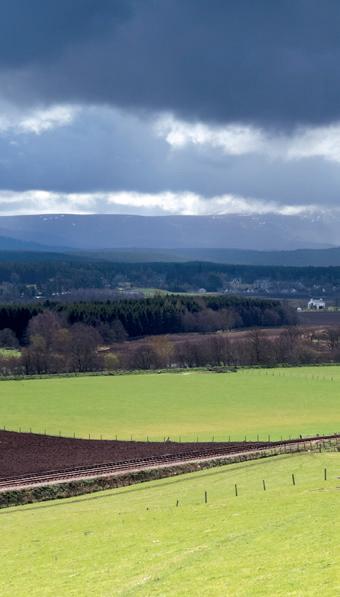

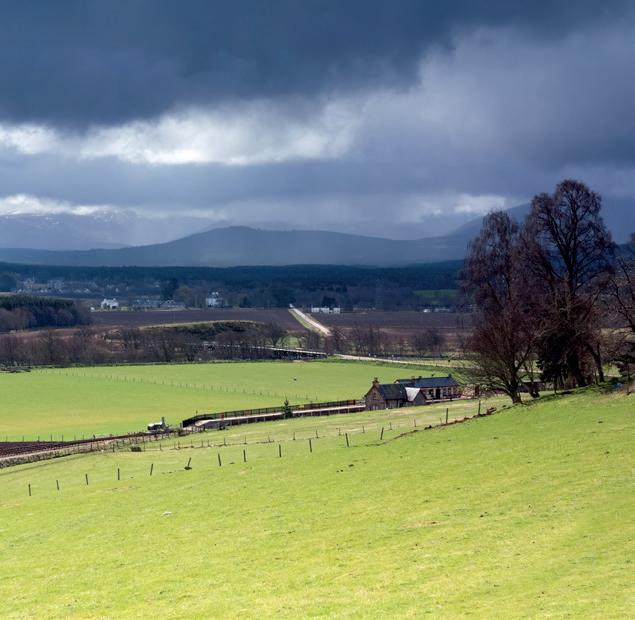

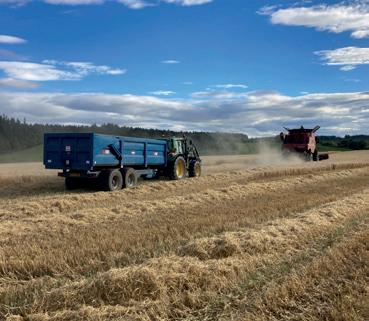





It’s been a hugely challenging year for farmers and crofters up and down the country which started off with a winter dominated by storms that brought devastating flooding to many.
At our annual conference in February, I laid out fi ve clear asks of Governments, retailers and consumers namely; an enhanced budget for agriculture on a multiannual financial framework to be delivered into the rural economy in a manner that rewards fairly; to push a Scottish first programme when it comes to public procurement of food and drink; to

in the best interests of Scottish Agriculture, the climate and the economy. The Act is not only the most significant piece of legislation for Scottish Agriculture in recent time, but it also provides a platform of opportunities for growth and securing a profi table, sustainable
We enter 2025 facing change. It will be the first time in over 50 years we will not be completely under an EU policy framework.
fully return the £61m of unallocated funds as a matter of urgency to the rural portfolio; to enable fairness throughout the whole supply chain; and for the sake of our economy and the environment, Scrap the Bute House agreement.
These asks were front and centre of the Union’s activity during 2024 – my last year as President of NFU Scotland. The fruits of our labour have been presented in various forms including seeing producers making improvements to packaging to make products more evidently ‘Scottish’, and the passing of the Agricultural and Rural Communities (Scotland) Act 2024 which is designed to deliver
future for those living and working in rural Scotland.
At every opportunity we have travelled across the country keeping members informed and engaged of progress with the Bill, now Act, and pushed hard for more certainty on funding requirements we believe are critical to the successful delivery of all the asks of us that the Act identifies. Visits and meetings with politicians in Westminster and Holyrood, and on farm have been a regular fi xture all year to make our case and raise awareness of the challenges and inspiring activity already in place.
Our Manifesto ahead of the General Election highlighted our
asks of Westminster politicians. The country delivered a new Government which has since announced devasting decisions around taxation on top of discontinuing an over 50-year-old ring-fenced safety net on funding. Thousands rallied at Westminster and Holyrood to ask for revised thinking and fair funding allocation. All of us must keep lobbying hard in the best interest of Scotland’s farming and crofting businesses and communities.
Other issues like river management, clearer labelling, species management and debate about a new national park have also been high on the agenda this year and seen the Union invest hours of resource to gather and present evidence directly to decision-makers. We won’t ever relent or shy away from making our voices heard on key issues.
We enter 2025 facing change. It will be the first time in over 50 years we will not be completely under an EU policy framework. This will bring, I am sure, yet more challenges to our industry but equally many opportunities too and I am looking forward to seeing what the future holds.
It has been a privilege being President of such a strong and respected organisation and I thank you for bestowing your trust in me over the past four years.
John Davidson
It’s been another busy, challenging, but rewarding year at NFU Scotland and I’d like to thank each of you for your continued support, guidance and encouragement. This has been appreciated by the entire staff and Presidential team who are working tirelessly day-in-day-out on your behalf.
Last year, I said that as I travelled the country meeting members the thing that struck me most was their resilience in the face of unrelenting challenges, yet the incredible optimism for the future. I still see this resilience today.
I also said that we were beginning the process of developing a new Business Strategy in order to give us a laser focus on the issues that really matter to members and I’m delighted this was published in June. This is important for a number of reasons, not least because at its core is our overall mission – to drive profitability into the industry.
Some of you have heard me say – if farmers aren’t profitable then there won’t be an industry in the future to grow food and manage our land. This mission will be the golden thread that drives everything we do.
Our policy work continues to be central to our efforts and we’ve achieved a huge amount in the face of unprecedented workloads. We are a leading voice in influencing the future of agriculture policy, including securing the passage of the Agriculture and Rural Communities (Scotland) Act 2024 which enables vital future support. This is just one of literally hundreds of workstreams being pursued by the team.
The other strategic focus for us is in relation to the market and how we can influence retailers and others to source more Scottish produce and, crucially, deliver

We are a leading voice in influencing the future of agriculture policy, including securing the passage of the Agriculture and Rural Communities (Scotland) Act 2024 which enables vital future support.
fairness in the supply chain. For too long the balance of power in supply chains has been skewed and we are investing more effort in rectifying this, including through our reinvigorated ‘shelfwatch’ campaign which is giving us vital evidence on retailers’ sourcing policies.
As I write, both the UK and Scottish Governments have published their draft budgets and they are a mixed bag. The UK Government budget is, frankly, a bad budget for agriculture. The proposed change to Agriculture Properly Relief is just one bad policy amongst many and we will continue to fight these. The Scottish Government budget appears slightly more positive, albeit we will be seeking to further influence this in the weeks and months ahead.
Above all, our members remain at the heart of what we do. We’ve
sought to increase our member engagement and I know this has been welcomed. Our members continue to be loyal and our membership numbers are steady, and we are grateful for the trust you put in us to represent your interests.
Over the next 12 months we will be seeking to grow our membership. One of the ways we will be doing so is through our new partnership with the SAYFC, where their members will be offered membership. We are also undertaking work to examine how the Union can become even more diverse and inclusive and, if we get this right, this will ensure we build on our success and cement our reputation as one of the most respected membership organisations in Scotland.
Thank you again for your continued support.
IConnon
t’s been another huge year for NFU Scotland with multiple live priorities. I have had the pleasure of travelling throughout most of Scotland again this year, be it to Shows, Branch Meetings, AGMs or specific farm visits. Nothing beats getting boots on the ground and engaging with our members. The revamp of the policy team has seen me being assigned to the Food and Farming team, which deals with all the production committees and working groups - namely Livestock, Milk, Pigs, Poultry, Combinable Crops, Horticulture and Potatoes.
Our policy team now consists of two teams, Food and Farming and Climate Land and Business. I oversee the latter team covering LFA committee, Legal and Technical, Environment and Land Use, Next Generation, Crofting, Highlands and Islands and a new area, supply chain returns.
The role of the Vice-President is to take an overview and identify overarching issues and facilitate resolution, occasionally getting into detail.
These committees have very different conversations from redesign of LFASS, Land Reform, tenancy law, access, biodiversity, species management, future

Common themes have included the need for profitability, too much regulation, increased costs, labour availability, undermining by imports and supply chain issues. I have been involved in the increased engagement with retailers, processors, maltsters, distillers and the Scotch Whisky Association. The Shelfwatch campaign will see a fourth audit in January 2025 and it is essential
that we keep this up and highlight good and bad practice. An initial analysis of consumer behaviour gave us more evidence on the need for adequate labelling.
The huge rallies in Westminster and Holyrood have highlighted the mood of an industry. We can deliver on so much provided profitability and Governments allow us to do so.

opportunities in farming and the barriers, data management, green finance, utilities, and crofting law reform.
The role has also provided me with the opportunity to present Union activity to a wider audience such as Utility Seminars at the Highland Show and AgriScot. Oversight is enhanced with visits to and meetings with other organisations such as the Scottish
Land Commission, James Hutton Institute, NatureScot and the Crofting Working Group.
A highlight this year has been the progress we’re making with lobbying to mitigate the potential long-term impact of the Land Reform Bill which I was first involved with when I chaired the Legal & Technical committee. Hats off to all who have participated in some very complex work.
Media demands on NFU Scotland at Westminster and Holyrood rallies this year demonstrated that we remain the number one organisation for informed comment on issues related to Scottish food and farming.
Across both rallies, the total number of live and pre-recorded media interviews undertaken stretched to more than 60 and covered TV, radio and print. It saw NFU Scotland’s views represented from local weekly regional papers to major UK news channels and all points in between, reaching audiences that ran to millions.
For more than 20 years, we have provided media training for those members and staff most likely to represent us when asked for comment by the press.
With strong staff support, NFU Scotland can put well-briefed offi ceholders and staff in front of cameras, radio mikes and journalists with notepads confi dent that they will not fl uff their lines when it comes to representing our farmers and crofters.
The way audiences, including our members, want to receive news and information is changing. Producing more than 100 news releases, 50 blogs and countless comments annually for the press to tell our story is only part of the picture.
Increasingly, we are using video






content sourced from offi ceholders and staff on our social media channels to complement our media output. There has been a surge in the use of webinars to keep members informed on policy developments with recordings posted to our website for reference.
Directing members to our website for information on news, policy and events has seen a record number of hits and unique visitors in 2024.
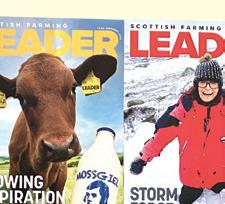
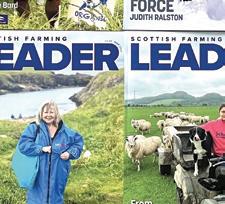





















We’ve produced and delivered members 11 issues of our leading publication in 2024 reporting on all the key activity of the policy and regional teams in addition to shining the spotlight on just some of the many inspiring individuals within our sector who are examples of the rich talent pool within our farming and crofting communities. They have shared their passions, innovative ideas and provided us all with a brief insight into business ventures. Working closely with the new production and design team these stories have breathed new life into the magazine and attracted some valued advertisers. There’ll be much more to come in 2025.
























To keep members updated on our policy successes, extensive Union activity and members services news, we have introduced quarterly reports this year. Quick to read these period snapshots of NFU Scotland are available to read online. Much of the content has additionally been communicate through out social media platforms.
In August, Diana McGowan, Senior Communications Manager, attended the International Guild of Agricultural Journalist Conference in Switzerland as one of only two UK recipients of the Joe Watson Bursary awarded by the British Guild of Agricultural Journalists.
NFU Scotland represents farmers, crofters and producers from all corners of Scotland. Our ten regional teams continue to work hard to deliver support to members, understand and resolve local issues. They provide a critical channel to ensure input into national policy, lobbying, consultations and vice-versa. They also arrange and manage a wider range of meetings and events. Right from the get-go this year, the teams have been delivering and supporting our members whether it be responding to flooding following extreme weather events over the winter to helping encourage participation in recent rallies and engagement with local politicians, the volume of work undertaken is not to be underestimated from season to season. Here is a snapshot of some of that activity.
The Minister for Agriculture and Connectivity visited Argyll to meet David Colthart, Appin to discuss the impacts that Sea Eagles are having on sheep farmers and crofters in the region.
Stockjudging - An amazing £1200 was raised for Strathcarron Hospice at the Regional Stockjudging event held this year at Wester Lochdrum Farm thanks to the Denholm family.




UK Wildfire conference hears from worldwide speakers on the importance of controlling fuel loads - grazing livestock and prescribed burns (e.g. Muirburn) play a huge part solution.

AYRSHIRE
The Ayrshire family day is a fantastic event as it brings together families and engages multiple generations of our membership.
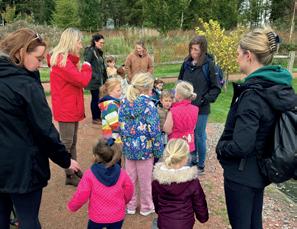

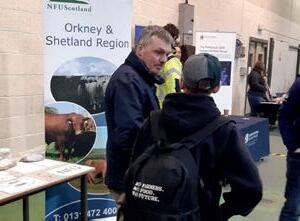
We have been very heavily involved during 2024 working with the next generation and promoting careers in the industry via Orkney College and DYW.

NFU Scotland and NFU Mutual Show stand crowned ‘Best Large Stand’ and ‘Overall Stand’ winners at Perth Show.
A successful Open Farm Sunday was held on Bigton Farm in June assisted by Regional Policy Advisor Lee Smith and Chair Cecil Eunson.

Unsung Hero Award presented to Gary Christie, Birchfield, Haughs of Glass Farm, near Huntly for commitment to the industry, his community spirit in caring passionately about justice and doing things right for the right reasons.












The Hamiltons at Bee Edge hosted a fantastic farm walk in July with lots of new and old faces attending. Great fun socialising and enjoying a BBQ.

Lots of Dumfries and Galloway members now feel confident in ‘What to Expect at Inspections’ thanks to our joint NFU Scotland and RPID meeting series.
1 x NEW First Minister 1 x NEW Prime Minister
Nearly 400 meetings with MSPs, MPs & Lords
SCOTTISH PARLIAMENT marks 25 th Anniversary in May (special feature in Scottish Farming Leader)
First Minister speaks at NFU SCOTLAND SEMINAR at AGRISCOT in November
Staff & Board raised over £1,700 for
records its 1000 th Enquiry since establishment in July by completing the Great Glen Challenge
launched in March –by end of May it had assisted members with over £1million of business loans & funding
Over 300 vehicles bought by members using our member benefits discounts
Over 1300 members & stakeholders turn out for NFUS Rally at Holyrood
NFU Scotland referenced nearly 100 times at Holyrood & Westminster since the beginning of this year
NFU Scotland’s Presidential team engaged with members & politicians at Met with First Minister & all Scottish party political leaders throughout the year
Out of more than 1000 organisations , NFU Scotland records the highest number of engagements with MSPs (Scottish Parliament Lobbying Register)
First Minister speaks at our NATIONAL CONFERENCE in February
13,000 followers on X
2100 Instagram followers nfuscotland
Land reform has been a key workstream for us in 2024. We have worked hard with our Legal and Technical Committee and Tenants Working Group to gather members’ views and input to the pre-Bill process. Since the Bill was published, we submitted a response to the call for evidence and have been called for oral evidence to the Net Zero Energy and Transport Committee twice. The Bill progress is slow,
we know that Stage 1 won’t be complete till spring 2025. In the meantime, we’ve continued to participate with the Tenant Farming Advisory Forum on agricultural tenancy issues and with the Scottish Land Commission’s Good Practice Advisory Group. Land reform and related issues remains a key policy workstream for NFU Scotland and will remain so over the next year as the Bill progresses.




The new 410 day calving interval conditionality being introduced to SSBSS is one of the new changes to support from 2025, alongside the introduction of new peatland protections (GAEC6) and Whole Farm Plans (WFP). We have worked hard influencing the changes since the announcement at the Royal Highland Show in 2023. Carrying on from our key asks established in 2023, our work this year has focused on pursuing clarity for those exceptional unforeseen circumstances, or force majeures. We secured some case studies from Scottish Government which can be found in the frequently asked questions as part of the RPID guidance.
We also hosted a successful member webinar giving an update on everything you need to know on the reform for 2025. This is available in the members’ section of our website alongside other briefing materials on SSBSS. Jim Fairlie MSP, Minister for Agriculture and Connectivity confirmed that the calving interval will remain at 410 days in 2026 at our Autumn conference, we remain engaged with Scottish Government on the roll out of the new scheme, any future changes to SSBSS and securing the future of coupled support in the new future support framework.
We know that from 2025 farmers and crofters will have to undertake certain actions to receive their agricultural support payments including Basic Payment Scheme support. One of those actions is the introduction of the first Whole Farm Plan which will require farmers and crofters to complete two ‘baselining activities’ from the following: carbon audits, biodiversity audits, soil analysis, animal health and welfare plans, or integrated pest management plans. The other condition is new requirements to prevent degradation and protect peatlands and wetlands under Good Agricultural Environmental Conditions (GAEC) 6.






We want to have a greater focus on supply chain issues, so we have started to realign our policy resources to provide this. ShelfWatch is our project that shines a light on how retailers are making Scottish produce available to consumers. We have done three ShelfWatch phases in 2024, with a further one due to take place in January 2025. This has given us a picture across different sectors of levels of Scottish produce as well as UK and products imported from elsewhere. This has enabled us to start high-level strategic conversations with the retailers and we will push to ensure these conversations are ongoing.

The introduction of bEID continues to be a priority for us. This year we have hosted the Minister of Agriculture and Connectivity, Former Parliamentary Under Secretary of State for Scotland Office and our UK Union Counterparts. We have met with officials from the European Commission and written to all levels of government to

underline the opportunities for Ultra- High Frequency (UHF).
This year we also responded to both UK Government and Scottish Government consultation on the introduction of bEID. We continue to lobby for the results of this to be published including the decision on bEID’s introduction. We continue to advocate that, in order for



the industry to get the full benefit of EID, we must mandate UHF. It should be introduced through a phased introduction, starting with newborn cattle being tagged with UHF EID from January 2026. Scottish Government have stated a preference for UHF however we continue to lobby for them to commit to a timescale for introduction.



Over 2024, we have continually engaged with both NatureScot and the Scottish Government on its wide-ranging Strategic Framework for Biodiversity in Scotland. In responding to the consultation, the Environment & Land Use (ELU) Committee worked tirelessly to scrutinise the details – which included looking at over 100 actions across different land types that will be required to be undertaken to halt the loss of biodiversity by 2030.
In our submission, we explicitly said that these proposals were a starting point, and that due to the breadth and depth of the consultation and the short timescale to respond, further engagement with our members will be required to fully assess the impacts.
In January, we also gave evidence to the Scottish Parliament’s Net Zero, Energy and Transport Committee on the proposals. We used this to echo key points made in our submission and emphasised the fact that more work must be done with the sector to assess the impacts of the proposals on farmers and crofters. ELU Chair, Peter Douglas, Vice-President, Alasdair Macnab and Senior Policy Manager, Sarah Cowie also met with NatureScot in November 2024 to discuss next steps.
The deadline for this consultation has passed, but it is clear that biodiversity and nature restoration will be front and centre in in 2025 and beyond. It is imperative that the finer details of the proposals are co-designed with the industry over the coming months. We believe farmers, crofters and land managers should be an integral part of this process and will continue to champion this.


For more than ten years the Poultry Working Group have been urging Scottish Government to update the existing poultry register. We have called for an online register that.
• covers all poultry keepers,
• is easy for commercial keepers to keep updated,
• actively engages with small producers to keep records up to date,
• provides a way of reaching all keepers with important messages such as disease alerts and biosecurity advice. The previous poultry register only required keepers with more than 50 birds to register and did not provide a reliable communications route to all keepers. The new Scottish Kept Bird register requires all bird keepers, even those with only one bird, to register and provide contact details, providing a quick and efficient way of contacting all keepers with important disease and policy guidance relevant to them.

Digital Grain Passports (DGP) have been an emotive and important issue for our cereal growing members. Over the last 24 months, we have consulted members and been involved in leadership discussions around DGP. Our position remains that we are unsupportive of the Digital Grain Passport proposal as things stand. Recently, the Combinable Crops Committee decided that there was to be no further NFU Scotland involvement in the DGP Leadership Group and the Leadership group were free to continue the project without our involvement. The Committee agreed that the current paper system is functioning well for what our farmer’s need, is cost effective and simple, hence no great urgency to change.

Galloway has now been confi rmed as the proposed location for Scotland’s next National Park. NatureScot has launched an extended fourteen-week public consultation, before submitting its fi ndings to Ministers by 28 April 2025. In late August, NatureScot published its plan on how it would take forward the Reporter investigation and in November the consultation itself, which contained a number of diff erent options, was published. The consultation will close on 14 February 2025.
We have lobbied strongly against the proposals for a new National Park. This includes writing to the Cabinet Secretary for Rural Aff airs, Land Reform and Islands, Mairi Gougeon MSP, on our opposition. Our Regional Manager for Dumfries & Galloway also gave evidence in the Scottish Parliament in October. We will continue to hold local meetings to gather our members’ views on the proposals and will be submitting a formal response from NFU Scotland, as well as encouraging members to respond individually.


In July we held a series of ‘Diversity Discussion’ events across the country which complemented our wider diversity research activity (including a survey, focus group meetings and interviews with external organisations both within and outwith the agricultural sector) to better understand how NFU Scotland can engage with and represent everyone contributing to Scotland’s agriculture sector. These events and meetings generated insightful conversations with people from all walks of life, highlighting barriers preventing and opportunities for reform. Diversity of thought is essential for any organisation and sector to thrive. That is why this piece of work was so important and will help to improve the Union’s engagement going forward.



The Royal Highland Show provided an opportunity for our Next Generation group to increase its political engagement and once again highlight key issues. We were pleased Cabinet Secretary for Rural Affairs, Land Reform and Islands, Mairi Gougeon MSP, for coming along and listening to our key issues which include securing sufficient funding for practical training courses and apprenticeships, and the impact the Land Reform Bill proposals may have on the Next Generation.
The Show also provided us with the platform to launch our new partnership agreement with the Scottish Association of Young Farmers Clubs (SAYFC) to ensure the voices of the next generation were heard. Our NFU Scotland CEO, John Davidson and Penny Montgomery CEO of SAYFC signed an official Partnership Agreement to outline commitments from both organisations. Through this partnership we aim to enhance collaboration on issues affecting Scottish agriculture in the joint interests of each organisations’ members. We already have a great working relationship with SAYFC, but formalising this into an agreement ensures we have a clear direction going forward.
This year, our main focus has been Crofting Law Reform. Policy staff have attended Crofting Bill group meetings to discuss potential legislative changes to crofting law ahead of the Bill being introduced. These meetings helped to inform the basis of a consultation which was published in June 2024. The consultation ran until the 2 September. During the consultation period, we ran a series of regional focus meetings allowing discussion across the crofting regions on the proposed changes. Some of these changes included the introduction of joint tenancies, changes to standard securities, duties of grazings committees and changes to help with Crofting Commission administration.
Throughout 2024, the Crofting Highlands and Islands Committee has worked hard discussing the consultation and providing information to allow for a detailed response to be submitted.
We now look forward to the new year where we will see the Bill introduced and have another opportunity to feed in our thoughts.

Fairness in the supply chain has been a priority for NFU Scotland for a longtime and the issue has always been particularly in the dairy sector. The Voluntary Code of Practice (VCOP) achieved considerable changes but not everyone signed up to it and overtime much of the progress we made was unpicked and at times of market downturn we saw the VCOP ignored.
We continued to raise abuses of power to government and regulators, and in 2018, the Grocery Code Adjudicator (GCA) highlighted this which led to the Government recognising the need to legislate in this area, as voluntary efforts were failing.
In 2020, NFU Scotland jointly launched, with the other UK Farming Unions and Defra, a consultation to consider a new mandatory code for dairy contracts. The outcome of this consultation was that the Government should legislate and in April 2024 the Fair Dealing Obligations (Milk) Regulations passed through the houses of Parliament and became law in July this year. Throughout the development of Regulations, NFU Scotland sought legal advice to ensure the impact of the Regulations were considered and met with numerous Defra and Scottish Government Ministers.
But the work on fairness in the supply chain doesn’t stop. Now the legislation is in place, we will continue to ensure that it delivers the change asked for in the consultations by our members and that the opportunities it creates.


We welcomed the then First Minister Humza Yousaf MSP to our National Conference in February. The theme of the conference was securing a profitable and sustainable future for Scotland’s farmers and crofters, and the benefits that would deliver for our rural economy, our rural communities and our ambitions on increasing biodiversity and reducing emissions. Over the packed two-day event attracting over 400 delegates hear from excellent mix of speakers from across the sector, delicious food provided by sponsors and engaged in lively discussion and debate.
The First Minster gave a keynote address to the more than 400 assembled in which he confirmed his government’s commitment to supporting future agriculture policy and outlined how funding would be allocated via the Framework.


At the end of 2023 we met with NatureScot to call out the lack of sharing and the significant imbalance happening within the Shared Approach Agreement. We called for an urgent reform of the agreement and approach to managing species conflict. We explained there is so much NatureScot and Scottish Government want farmers to do in terms of biodiversity and nature restoration, but they will not get buy-in unless they do more to reduce species conflicts.
In our submission to a review of Species Licensing we asked for greater transparency and consistency in the licensing process and more transparency around the conservation status of each species, and how a licensed activity may impact on the population rather than the individual. We asked for much more access to non-lethal control options, such as nest manipulation and sett removal, to reduce the need for lethal control licenses. We opposed cost recovery for licensing and a public register of licenses issued.
December saw the inaugural meeting of a new Ministerial-led Wildlife forum in response to our request for a forum to take forward a true ‘shared approach’. We will be pushing for all the management schemes and species concerns to be addressed in some way through this group.

This year has delivered a new First Minister in Scotland and a new Prime Minister and UK Government at Westminster.
In April we launched our Manifesto document which laid out our key asks for all political parties ahead of the General Election.
We have seen many politicians visit members on-farm learning firsthand about the sector and all it does to benefit and grow the economy, protect the environment and support rural communities. These have also provided excellent opportunities to discuss and highlight key issues and challenges being faced by farmers and crofters or celebrate fantastic innovations.
Since the General Election, we have been getting to know the many new Scottish MPs through meetings in London and local farm visits across our regions. Within weeks of the election, we held a farm meeting with the new Scotland

Office Minister Kirsty McNeill MP and have had meetings with the Secretary of State for Scotland Ian Murray MP and DEFRA Secretary of State Steve Reed MP and Minister for Food Security and Rural Affairs in London Daniel Zeichner MP.
From a Scottish Government perspective, the new First Minister, John Swinney MSP, has repeatedly underlined that as he has represented a rural constituency since 1999, he understands and supports the farming
The choice of members’ benefits has continued to be enhanced this year with new partnerships established and expansion of our membership helpline services. These not only provide NFU Scotland attractive discounts on a wide range of machinery,


and crofting sector. He spoke at the Agriscot Conference in November, came to the NFU Scotland stand at the Royal Highland Show and visited the President’s farm.
This year also saw the appointment of a new Minister for Agriculture and Connectivity Jim Fairlie MSP, and we have engaged with him and the Cabinet Secretary for Rural Affairs, Land Reform and Islands, Mairi Gougeon MSP throughout the year.
A major focus this year was the Agriculture and Rural Communities (Scotland) Act that passed in June, which is an important piece of legislation sets out the framework for future agricultural policy and we worked hard to ensure that it will deliver for farmers and crofters across Scotland.
NFU Scotland has recorded, once again, the highest number of engagements with MSPs on the Scottish Parliament Lobbying Register out of over 1000 organisations.
Next year, we plan to continue to hold constructive meetings to influence policy and highlight the vital role that farmers and crofters play in high-quality food production, climate and nature restoration and thriving rural communities.
vehicles and equipment but also some valued one-toone advisory services for members. Please do familiarise yourself with the opportunities available to you. Details and information on how to access these resources are available on our website nfus.org.uk.
NFU Mutual hails the work of FareShare, who are supported by Southern
WWWhile many people look forward to traditional festive fare at this time of year, others are unable to afford even the most basic food for themselves, and their families.
hile many people look forward to traditional festive fare at this time of year, others are unable to afford even the most basic food for themselves, and their families.
hile many people look forward to traditional festive fare at this time of year, others are unable to afford even the most basic food for themselves, and their families.
Learn how to make your money work best for you with advice from NFU Mutual on investing wisely and understanding your allowances
or many farmers, diversifying into farm shops has become a vital part of their business. But while farm shops offer a unique opportunity to sell directly to the community, they also face increasing threats from crime.
The cost-of-living crisis – and rising cost of even basic foods – has made it even more difficult for many people to put a meal on the table this year. In fact, more than 13 million people in the UK face food insecurity, according to FareShare, the UK’s biggest charity fighting hunger and food waste.
The cost-of-living crisis – and rising cost of even basic foods – has made it even more difficult for many people to put a meal on the table this year. In fact, more than 13 million people in the UK face food insecurity, according to FareShare, the UK’s biggest charity fighting hunger and food waste.
eeping all of your money in cash savings accounts may seem like a safe option. But you may miss out on the potential to grow your money, particularly if interest rates don’t keep up with inflation. Now could be a good time to reconsider how and where to keep your money, and understanding your allowances can be helpful.
New research from NFU Mutual has revealed that two-thirds of rural retailers surveyed have been affected by crime in the past year, with some businesses suffering losses of up to £200,000.
Take steps to deter criminals and increase staff safety in your farm shop
Top up your pension
WAt the same time, every year, more than three million tonnes of good-to-eat, surplus food goes to waste on UK farms. That’s enough for seven billion meals, according to FareShare, which takes good-to-eat surplus food from across the food industry, sorts it and passes it onto a network of nearly 8,500 charities and community groups across the UK.
At the same time, every year, more than three million tonnes of good-to-eat, surplus food goes to waste on UK farms. That’s enough for seven billion meals, according to FareShare, which takes good-to-eat surplus food from across the food industry, sorts it and passes it onto a network of nearly 8,500 charities and community groups across the UK.
As farm shops are often located in remote areas they can become easy targets for thieves. From stock theft to vandalism and even violence towards staff, these crimes not only threaten the livelihoods of farm businesses, but also undermine the trust and safety that farm shops build with their local customers.
The current tax year ends on 5 April 2024. Here are some things for you to consider:

planning is not regulated by the Financial
Heat stress can have a major impact on farm businesses but you can protect dairy cattle.
ith climate change driving hotter and more extreme weather, it’s no wonder that research conducted by NFU Mutual shows that heat stress in cattle is becoming a bigger consideration for farmers.
In 2022-2023, the charity redistributed 54,000 tonnes of food: enough to make 128m meals, or four meals every second. At NFU Mutual, we see it as part of our role to make positive impacts on the welfare of those working and living in rural communities in the UK, and we are only too aware of the growing impact of food poverty in rural communities.
The cost-of-living crisis – and rising cost of even basic foods – has made it even more difficult for many people to a meal on the table this year. In fact, more than 13 million people in the UK face food insecurity, according to FareShare, the UK’s biggest charity fighting hunger and food waste. same time, every year, more than three million tonnes of good-to-eat, surplus food goes to waste on UK farms. That’s enough for seven billion meals, according to FareShare, which takes good-to-eat surplus food from across the food industry, sorts it and passes it onto a network of nearly 8,500 charities and community groups across the UK. 2022-2023, the charity redistributed 54,000 tonnes of food: enough to make 128m meals, or four meals every second. At NFU Mutual, we see it as part of our role to make positive impacts on the welfare of those working and living in rural communities in the UK, and we are only too aware of the growing impact of food poverty in rural communities.
In 2022-2023, the charity redistributed 54,000 tonnes of food: enough to make 128m meals, or four meals every second. At NFU Mutual, we see it as part of our role to make positive impacts on the welfare of those working and living in rural communities in the UK, and we are only too aware of the growing impact of food poverty in rural communities.

profitability.
Build an ISA nest egg
But what is heat stress and why is it a problem?
Putting money into a pension is one of the most tax-efficient ways to invest for the long term. The government helps you invest – for every £80 you pay into your pension, HMRC currently pays an extra £20 tax relief making your actual contribution worth £100. In a pension, any growth is free from UK Income Tax and Capital Gains Tax. There are however rules on the amount you can contribute to your pension each year and still receive tax relief.
At NFU Mutual, we understand the pressures you face in keeping your farm shop secure. Our recent survey found that crime costs rural retailers an average of £40,000 per year. In response, more than half of rural shop owners have invested in additional security measures, such as CCTV, panic alarms, and employee training in safety and self-defence.
Heat stress occurs when cows retain more heat than they can release, affecting both indoor and outdoor herds.
This is why our NFU Mutual Charitable Trust – which exists to promote and support charities working in agriculture, rural development and insurance – is proud to support FareShare’s fight against food poverty. Since 2021, the NFU Mutual Charitable Trust has donated a total of £250,000 to the charity.
This is why our NFU Mutual Charitable Trust – which exists to promote and support charities working in agriculture, rural development and insurance – is proud to support FareShare’s fight against food poverty. Since 2021, the NFU Mutual Charitable Trust has donated a total of £250,000 to the charity.
is why our NFU Mutual Charitable Trust – which exists to promote and support charities working in agriculture, rural development and insurance – is proud to support FareShare’s fight against food poverty. Since 2021, the NFU Mutual Charitable Trust has donated a total of £250,000 to the charity.
The cause is due to a rise in environmental temperatures and humidity and an increase in the cow’s heat production associated with increasing milk yields. To monitor heat stress levels, the industry uses the Temperature Humidity Index (THI) which indicates how severe the condition could be and suggests that action needs to be taken.
But what more can be done to protect your farm shop from becoming a target?
NFU Mutual can provide you with tailored advice and insurance to protect your business. Speak to your local NFU Mutual Agent today to find out how we can help safeguard your farm shop. We’re here to support you, so you can focus on what matters most –running your farm business with peace of mind.
How farms are donating their surplus for good Farms and rural businesses throughout the UK are also doing their bit to help. They can participate through FareShare’s Surplus with Purpose scheme, which helps businesses to cover the extra costs of redistributing their unsold food to people who need it most.
How farms are donating their surplus for good Farms and rural businesses throughout the UK are also doing their bit to help. They can participate through FareShare’s Surplus with Purpose scheme, which helps businesses to cover the extra costs of redistributing their unsold food to people who need it most.
How farms are donating their surplus for good Farms and rural businesses throughout the are also doing their bit to help. They can participate through FareShare’s Surplus with Purpose scheme, which helps businesses to cover the extra costs of redistributing their unsold food to people who need it most.
Once you reach 55 (57 from 2028), you can take money from your pension as you wish. The first 25% will normally be tax-free, any amount over and above is added to your other income and taxed. So withdrawing lump sums from your pension could push you into a higher Income Tax bracket. Spreading withdrawals over a number of tax years could help reduce the impact of any tax liabilities. There’s also a limit on the annual pension contributions you and your employer can make if you’ve already taken a taxable withdrawal from your pension. This could mean you miss out on valuable employer pension contributions in addition to your own.
In recent years industry studies have highlighted the condition and the impact it can have on farm businesses. It’s generally acknowledged that heat stress can result in:
avoids thousands of tonnes of surplus fresh fruit and vegetables, meat and dairy products being wasted. Even cupboard items, and chilled and frozen foods, find a new home as part of the scheme.
You can invest up to £20,000 this tax year in an ISA, building up a nest egg free of UK Income tax and Capital Gains tax.
avoids thousands of tonnes of surplus fresh fruit and vegetables, meat and dairy products being wasted. Even cupboard items, and chilled and frozen foods, find a new home as part of the scheme.
But the Surplus with Purpose scheme avoids thousands of tonnes of surplus fresh fruit and vegetables, meat and dairy products being wasted. Even cupboard items, and chilled and frozen foods, find a new home as part of the scheme.
Here are some simple but effective steps you can take to reduce the risk of theft and crime:
• Health-related issues such as increased risk of disease, lameness and reduced fertility. There is also evidence to suggest that it affects the unborn calf and their subsequent performance.
The same tax benefits are available with Junior ISAs, which you can use to build up a pot of money for a child – they’ll be able to access that when they’re 18 years old. The maximum Junior ISA contribution is £9,000 in the 2023/4 tax year.
Furthermore, farmers tell us they’re not always aware of the extent of the financial losses they’re suffering from heat stress in cattle.

property other than their main home, will enjoy fall from £6,000 to £3,000 from April 2024.
Things you should know:
When buffer feeding adding suitable feed additives to maintain rumen health and ensure peak nutrition.
• Use customer service as a deterrent – greet every visitor warmly as soon as they enter the shop. This lets potential thieves know they’ve been noticed and can deter shoplifting.
Putting money aside for children can also help reduce your potential Inheritance Tax bill.
Key actions you can take
One grower making the most of the opportunity presented by the scheme is Southern England Farms, based in Hayle, West Cornwall. The business works over 6,500 acres and is a key supplier to several major UK retailers, including a number of supermarkets, of Cornish-grown courgettes, cauliflower, broccoli, spring greens, sweetheart and savoy cabbage.
One grower making the most of the opportunity presented by the scheme is Southern England Farms, based in Hayle, West Cornwall. The business works over 6,500 acres and is a key supplier to several major UK retailers, including a number of supermarkets, of Cornish-grown courgettes, cauliflower, broccoli, spring greens, sweetheart and savoy cabbage.
• The tax benefits of pensions and ISAs depends on individual circumstances and may change in the future.
• Organise your store layout strategically – ensure high-value items are placed in areas where they are easily monitored. Mirrors can help to reduce blind spots and keeping shelves tidy makes it easier to spot suspicious behaviour.
One grower making the most of the opportunity presented by the scheme is Southern England Farms, based in Hayle, West Cornwall. The business works over 6,500 acres and is a key supplier to several major UK retailers, including a number of supermarkets, of Cornish-grown courgettes, cauliflower, broccoli, spring greens, sweetheart and savoy cabbage.
excess produce is redistributed to those who really need it. It is so very rewarding when we find out how many meals our surplus veg has gone on to make. It is great that NFU Mutual has embraced the scheme so wholeheartedly and supports their customers who wish to participate in ‘Surplus with Purpose’ too.”
way of ensuring excess produce is redistributed to those who really need it. It is so very rewarding when we find out how many meals our surplus veg has gone on to make. It is great that NFU Mutual has embraced the scheme so wholeheartedly and supports their customers who wish to participate in ‘Surplus with Purpose’ too.”
excess produce is redistributed to those who really need it. It is so very rewarding when we find out how many meals our surplus veg has gone on to make. It is great that NFU Mutual has embraced the scheme so wholeheartedly and supports their customers who wish to participate in ‘Surplus with Purpose’ too.”
• Implementing ‘Siesta’ Management where appropriate – this technique involves cows grazing directly after milking and then being ‘housed’ at around 10am, with buffer feed available to them. Cows are then sent back out to graze after afternoon milking to graze until dusk.
• The value of your pension and investment funds can go down and you may get back less than you invested.
• Train your staff – equip your team with knowledge about shoplifting tactics and safety protocols. Ensure they feel confident in handling difficult situations while staying safe.
• Adjusting milking times to coincide with the cooler periods of the day.
• Limit high-value items on display – secure expensive stock in locked cabinets or behind the counter, and ensure remaining stock is stored securely out of sight.
Our latest research has found that just over four in ten (41%) say that heat stress is a priority risk for their business while 70% are yet to take further steps to reduce the risk. *
• Installing shade and fans in holding yards.
Don’t forget Inheritance Tax planning It’s wise to take a long-term view on inheritance planning, so that your heirs don’t pay more tax than they need to.
Co-owner Jane Richards, along with her 400-plus pickers, works with FareShare to ensure any excess vegetables never go to waste. Since 2019, they have donated 396 tonnes of excess produce to the charity.
Co-owner Jane Richards, along with her 400-plus pickers, works with FareShare to ensure any excess vegetables never go to waste. Since 2019, they have donated 396 tonnes of excess produce to the charity.
Co-owner Jane Richards, along with her 400-plus pickers, works with FareShare to ensure any excess vegetables never go to waste. Since 2019, they have donated 396 tonnes of excess produce to the charity.
We at NFU Mutual applaud Jane and all the team at Southern England Farms for their outstanding efforts in supporting the work FareShare does to alleviate food poverty in our communities.
We at NFU Mutual applaud Jane and all the team at Southern England Farms for their outstanding efforts in supporting the work FareShare does to alleviate food poverty in our communities.
We at NFU Mutual applaud Jane and all the team at Southern England Farms for their outstanding efforts in supporting the work FareShare does to alleviate food poverty in our communities.
• Minimise cash on the premises – use counter safes to deposit cash regularly throughout the day and keep large sums of money in a secure safe overnight.
• Implementing a tree planting programme at the boundaries of grazing paddocks to provide suitable levels of shade within the grazing environment.
Should you suspect heat stress with your dairy cattle this summer, Dr Tom Chamberlain** highlights some of the key actions that you can undertake to reduce heat stress whilst cows are grazing:
We’re proud to support FareShare –and we praise all farms and rural businesses who participate in the Surplus with Purpose scheme.
We’re proud to support FareShare –and we praise all farms and rural businesses who participate in the Surplus with Purpose scheme.
We’re proud to support FareShare –and we praise all farms and rural businesses who participate in the Surplus with Purpose scheme.
• Invest in surveillance and alarms – high-quality CCTV, coupled with an alarm system that’s linked to an alarm-receiving centre, can be a powerful deterrent. Make sure your surveillance system provides clear images and complies with data protection laws.
Jane says: “No farmer ever wants to see their produce go to waste. But sometimes circumstances mean there is a surplus that will often go into the waste trailer or simply become compost.”
Jane says: “No farmer ever wants to see their produce go to waste. But sometimes circumstances mean there is a surplus that will often go into the waste trailer or simply become compost.”
NFU Mutual Research with Dairy Farms and Dairies, August 2021
One way of doing this is to make gifts to your loved ones, taking advantage of the annual £3,000 gift allowance, or the ‘gifts out of normal expenditure’ exemption. Larger gifts can also be exempt from Inheritance Tax as long as you live more than seven years from
Jane says: “No farmer ever wants to see their produce go to waste. But sometimes circumstances mean there is a surplus that will often go into the waste trailer or simply become compost.”
For more information about FareShare’s Surplus with Purpose scheme, and how you can participate, visit www. fareshare.org
While these measures can help to deter crime, it’s important to stay one step ahead. Keeping your farm shop and staff safe requires a proactive approach and working with a specialist like NFU Mutual can help.
For more information about FareShare’s Surplus with Purpose scheme, and how you can participate, visit www. fareshare.org
For more information about FareShare’s Surplus with Purpose scheme, and how you can participate, visit www. fareshare.org
To find out more about NFU Mutual insurance or financial services, speak to your local NFU Mutual agency office or visit nfumutual.co.uk/tax-allowances NFU Mutual Financial Advisers advise on NFU Mutual products and selected products from specialist providers. When you get in touch, they’ll explain the advice service and charges.
To find out more visit nfumutual.co.uk/ heatstress or contact your local agency office.
Show of strength at #FoodNeedsAFarmer Rally at Holyrood as more than 1300 call for a fair budget for Scotland’s farmers and crofters
Farmers, crofters and the whole supply chain turned out in force at Holyrood on a cold but dry Thursday 28 November to send a crystal-clear message to Scottish Government and Parliament that the Scottish Budget on Wednesday 4 December must deliver increased and ringfenced funding for Scotland’s farmers and crofters. In a show of unity, the whole supply chain of those who service and supply our sector –processors, auctioneers, hauliers, agricultural suppliers, vets, lawyers, accountants, agritourism, fellow membership organisations and many more - were represented in huge numbers (over 1300).
• 45 MSPs representing SNP, Conservative, Labour, Liberal Democrats and Greens attended to speak with constituents outside the parliament building.
The pivotal rally at Holyrood recognised that funding responsibilities for agricultural and rural policy are now entirely devolved to the Scottish Government. Scottish Government was asked to back its repeated statements that the industry will not face a funding ‘cliff edge’ with categorical commitment. A modest increase in rural funding would help maintain and expand the critical contributions of Scotland’s farmers and crofters to food security, economic growth, and climate and biodiversity goals.
The rally was addressed by: NFU Scotland President Martin Kennedy; Ben McClymont, Chair, NFU Scotland Next Generation; Ally Brunton, Chair, Scottish Association of Young Farmers Clubs; Cabinet Secretary for Rural Affairs, Land Reform and Islands, Mairi Gougeon MSP; Minister for Agriculture and Connectivity, Jim Fairlie MSP; Leader of the Scottish Conservative Party Russell Findlay MSP; Scottish Conservative Party Spokesperson for Rural Affairs Tim Eagle MSP; Leader of the Scottish Liberal Democrats Alex ColeHamilton MSP; Chief Executive of rural charity RSABI Carol McLaren.
Thank you to ABP for providing some delicious beef rolls.
The Rally attracted a huge volume of media interest before and during the event.




NFU Scotland officeholders and officials Martin Kennedy, Andrew Connon, Alasdair Macnab, Jonnie Hall and Beatrice Morrice met with Mairi Gougeon MSP and Jim Fairlie MSP after the event to discuss our key budget asks (See pages 53-54 which explains our budget submission).

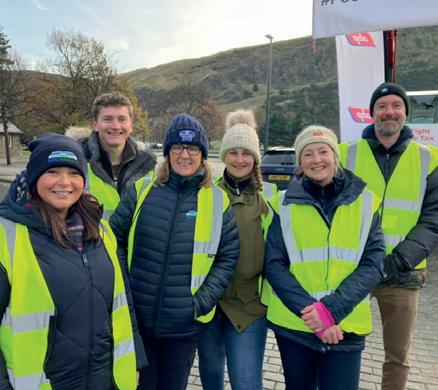










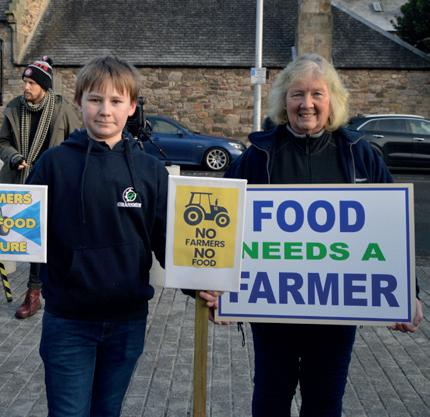

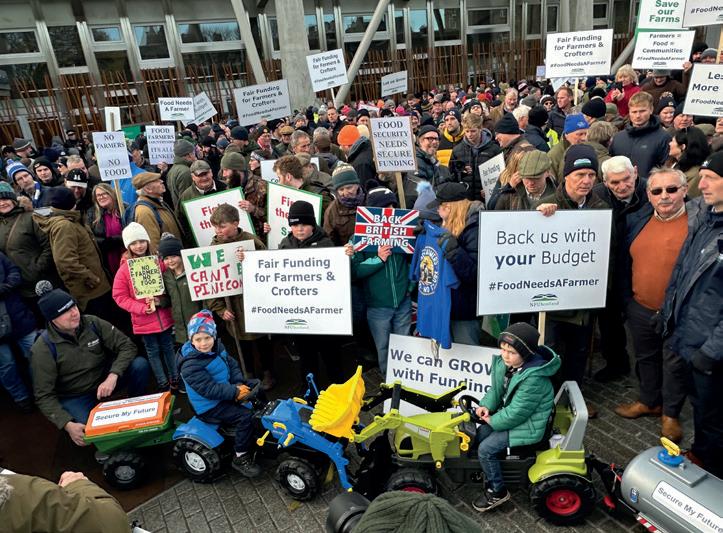




































President Martin Kennedy called on Scotland’s First Minister, John Swinney MSP, to deliver a budget for Scottish food and farming on 4 December at our NFUS seminar at this year’s AgriScot. And he urged all farmers, crofters and those involved in industries dependent on Scottish agriculture to join the planned rally outside the Scottish Parliament on 28 November in a show of strength to highlight what the industry delivers for Scotland and its economy. Martin said,
“The new UK Government’s first budget not only hammered hardworking family farms and crofts with crippling tax bills, but it also saw the UK Government wash its hands of a commitment to multiannual, ring-fenced funding for farming that has been in place for half a century. From a future funding perspective, that ball is now firmly and exclusively within the gift of Scottish Government. And that is why we need all those with the best interests of our farming, crofting, and food industries at heart to be outside Holyrood on 28 November in a show of strength.” You can read the whole of Martin’s speech posted as a blog on our website.
The First Minister gave a speech
that underlined the Scottish Government’s commitment to return the £46million reallocated funds and assured the audience of his understanding and support for the sector given he has represented a rural constituency since 1999. He also confirmed his intention to attend the NFU Scotland’s annual Conference in February 2025. You can read the First Minister’s speech on the Scottish Government’s website www.gov.scot
With the First Minister attending the seminar and in the wake of the UK Government’s budget on 30 October there was heightened media interest in what both NFU Scotland and the First Minister had to say. The Communications team fielded numerous media requests for interviews and coverage was extensive.
Read about the Scottish Dairy Hub with Kite Consulting seminar at AgriScot on page 49.









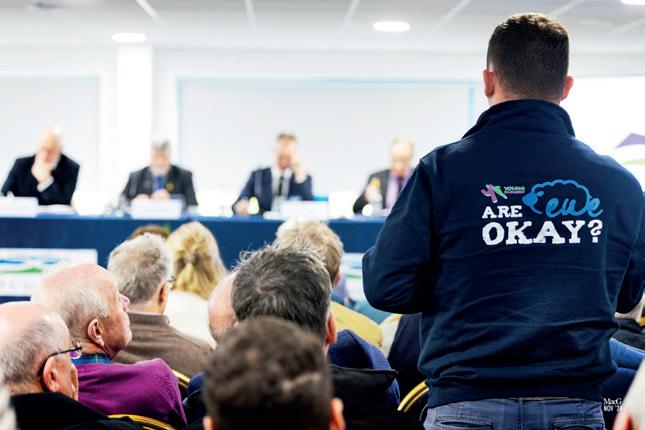





The NFU Scotland Autumn Conference was a packed affair with members filling the Pavillion at the Royal Highland Centre, Ingliston, to hear from an impressive range of speakers and socialise with other members.
Those gathered heard from; Jim Fairlie MSP, Minister for Agriculture and Connectivity; Former Scottish Secretary of State and newly announced chair of the Environment, Rural Affairs Committee Alistair Carmichael, MP for Orkney and Shetland; top Scottish co-operative Angus Soft Fruits chair Lochy Porter; Professor John Gilliland, respected farmer, researcher, and policy expert at AHDB and QMS; Peter Nelson, Operations Director at The Glenmorangie Company; Cora Cooper, Sheep Farmer of the Year; and Martin Kennedy, Jonnie Hall and John Davidson.
President Martin Kennedy used his final Autumn conference address to call for Scottish farmers and crofters to receive proper credit for their world leading green credentials. He said we can no longer sit back and watch others take the credit unjustifiably.
“Whether that’s green washing with big businesses buying into our carbon credits with no scruples and, more importantly, not actually doing anything meaningful to reduce their own failings. Or even worse, watching on as ‘rewilding’ initiatives driven by so called environmentalists are forced to sell land to pay off debts accrued by purchasing other land for rewilding using taxpayers’ money. Incredible! Some rewilding projects are driven by those who have little or no business sense whatsoever; have no appreciation of the unintended consequences that their projects create further down the track and do not understand what makes rural and remote communities thrive. This is exactly why we, as farmers and crofters, need to be very protective of our green credentials, many of which are already there in abundance due to traditional agricultural practices.”
Martin’s full speech was posted on our website as a blog. Here you can also find a blog from Cora Cooper.


















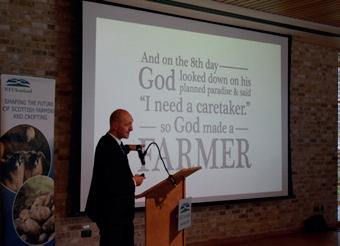


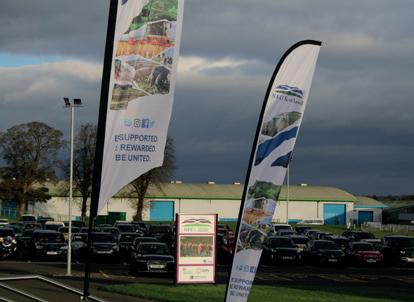










Affairs Assistant
Affairs Manager

NFU Scotland gave oral evidence recently on national parks to the Scottish Parliament’s Citizen Participation and Public Petition Committee who are considering a petition that calls for a halt to a new national park and for a review to be conducted on current parks. Mhairi Dawson, Dumfries and Galloway Regional Manager, clearly set out our concerns about the proposed new national park and underlined that many members in Galloway and Ayrshire were disappointed with the process. She highlighted that the aims in relation to agriculture, climate and biodiversity would already be delivered by the Agriculture and Rural Communities (Scotland) Act and that the multiple organisations that already exist in the area could deliver the other aims. She also highlighted the work NFU Scotland is carrying out to engage with NatureScot and our members across the region.

Since the UK Budget announcement on 30 October, NFU Scotland has been extremely busy engaging with Ministers, MPs, MSPs, offi cials and other stakeholders. The changes to agricultural property relief, National Insurance contributions, minimum wage increase, carbon border adjustment mechanisms and tax changes to vehicles used by farm businesses all are causing huge concern for our sector and we are doing all we can to ensure that the impacts on farmers and crofters are understood and listened to.
Several NFU Scotland representatives travelled to London on 19 November to take part in the organised rally and meet with MPs to explain why the APR change is such a concern for farmers and crofters. We held around 30 meetings with Scottish MPs from all parties at the House of Commons and our Presidential team met with the Secretary of State for Scotland Ian Murray MP. We have also provided detailed briefi ngs to MPs and MSPs in advance of several relevant debates held in the House of Commons and the Scottish Parliament on the impact of the budget on rural communities and agriculture. NFU Scotland welcomed that the Scottish Parliament supported a motion that calls on the UK Government to reverse the APR decision. We continue to engage with politicians at every level.

















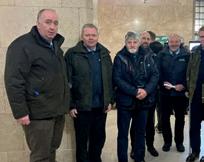

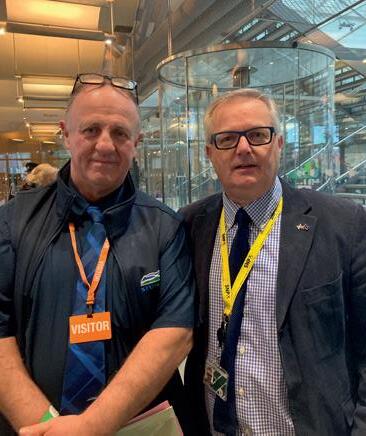




Our Head of Policy, Gemma Cooper, gave evidence to the Net Zero, Energy, and Transport Committee on the Land Reform (Scotland) Bill. Other stakeholders on the panel were Scottish Land & Estates and Countryside Alliance. The Committee asked multiple questions on how the Bill will impact farmers and crofters who are the lynchpin of our rural communities. Questions focused on land management plans, community engagement, lotting decisions. NFUS underlined the need to consider unintended consequences that could impact the sector going forward.
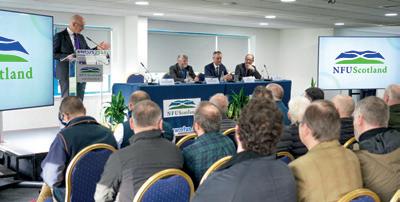
First Minister John Swinney MSP and Minister for Agriculture and Connectivity Jim Fairlie MSP joined President Martin Kennedy and Robert Neil at the NFU Scotland Panel Session at Agriscot in November. The First Minister gave a speech that underlined the Scottish Government’s commitment to return the £46million reallocated funds and assured the audience of his understanding and support for the sector given he has represented a rural constituency since 1999. The First Minister and Minister then answered questions on a range of issues including opportunities for next generation farmers, species management and the impact of the UK Budget.

NFU Scotland held an exhibition at the Scottish Parliament which provided the opportunity to highlight everything that farmers and crofters deliver with regard to high-quality food production, climate and nature, plus thriving rural communities. We also underlined the need for the Scottish Budget on 4 December to deliver an increase and ringfence funding commitment for Scotland’s farmers and crofters.
We met and received signatures of support from over 50 MSPs, including Ministers, party leaders and MSPs from across the central belt and rural areas.

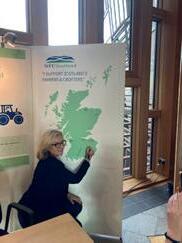



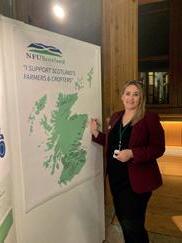



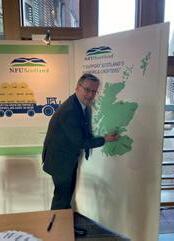










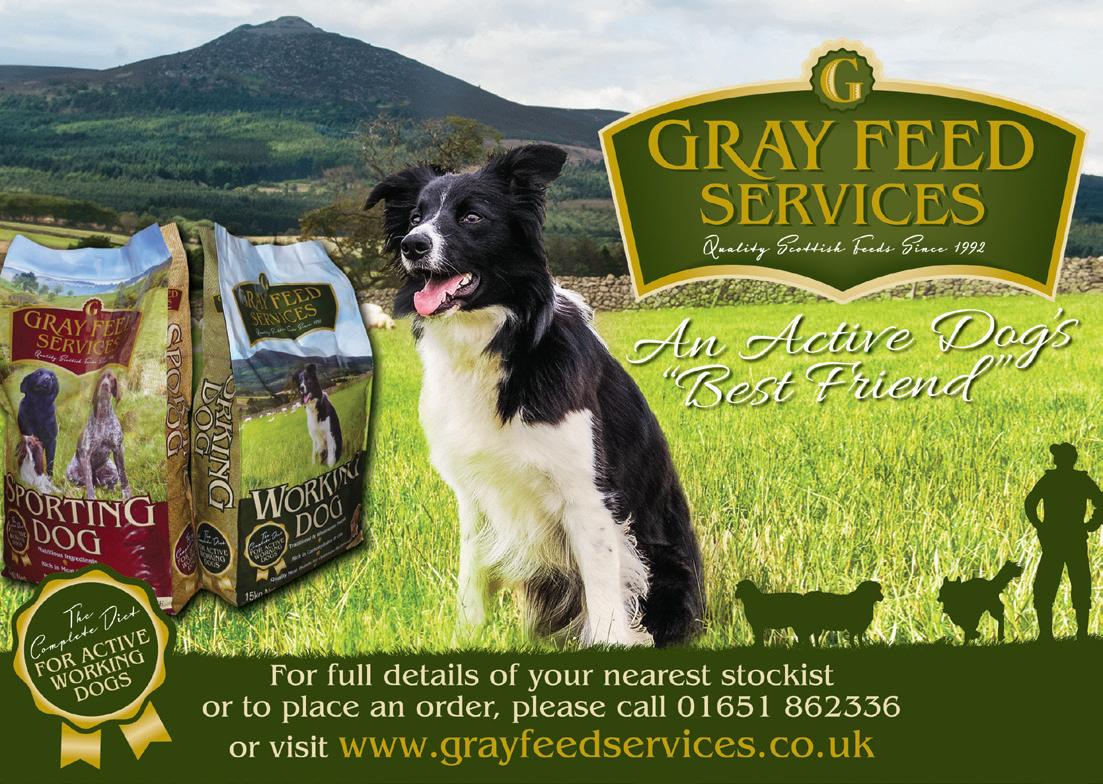



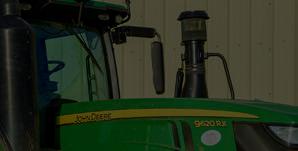









Sarah Cowie Senior Policy Manager
rom 1 January 2025 new requirements for peatlands and wetlands will be introduced under Good Agricultural and Environmental Condition (GAEC) 6 – maintenance of soil organic matter. This means a number of agricultural activities will not be allowed on these land types. This includes reseeding, applying pesticides or fertilisers, and planting trees. The full list of prohibited activities is on the RPID website.
The existing GAEC 6 aims to maintain soil organic matter levels by restricting ploughing on rough grazing or semi-natural areas. Cultivating rough grazing or seminatural areas without first ploughing the land can result in the same damaging effect as ploughing.
To provide enhanced protection, cultivating will be added to the existing requirements alongside ploughing as a prohibited activity on rough grazing or semi-natural areas.
There are certain conditions that have to be met for land to be considered either peatland or wetlands. A ‘Peatland Areas’ layer has been added to LPIS viewer to give farmer/ crofters a guide to whether they have any peatlands within their farm/croft boundary.
These changes are being introduced because Scotland has around 1.4 million hectares of degraded peatlands. Degraded peatlands are a source of greenhouse gas emissions and currently account for around 16 percent of the Scottish annual net total.
Peatlands in a good condition on the other hand, not only play a vital role in storing carbon but they also provide unique habitats as well as mitigating the effects of climate change by maintaining the steady flow of water and reducing flood risk.
Full guidance on the new conditions is available on the RPID website. Alternatively, feel free to contact me if you have any questions.




John Flanagan Senior Policy Manager

The Combinable Crops Committee recently met to discuss key priorities for the sector going forward. Chief amongst these was developing and maintaining strong relationships in our supply chains where profi tability is king.
As part of this Vice-President Andrew Connon delivered the keynote speech at the Maltsters Association of Great Britain’s (MAGB) annual luncheon where he highlighted the importance of having a profi table cereals sector which remains competitive and can afford to reinvest in the business.
We’ve also met the Scotch Whisky Association (SWA) recently for a roundtable discussion involving members of the Combinable Crops Committee and key members of the SWA. Again, the main focus of the meeting was to find ways to collaborate within the supply chain for a sustainable and profi table future for all.
Jack Stevenson, Chair of the Combinable Crops Committee said, “Overall, positive engagement like this in the supply chain is hugely important. Farmers are being pushed to produce grain more sustainability whilst also delivering benefi ts for the environment and biodiversity. This can be achieved if we have a profi table sector. Having a shared understanding of the challenges being faced by both sides and a constructive solution focussed dialogue can only be a benefi t.”
Andrew Connon said, “The recent engagement across the malting barley supply chain is encouraging. Over the past year, our members and representatives have had productive discussions with industry leaders. From the SWA and MAGB events, to the recent NFU Scotland Autumn Conference and the Committee’s tour of facilities like Boort Malt, we are seeing valuable progress with dialogue.”
Overall this is a hugely encouraging start but we now need to maintain the momentum and deliver positive outcomes for our members.





Al Walker
In recent years, Scottish agriculture has faced difficult changes and challenges, for example the most recent reform of Agricultural Property Relief risking the viability of our next generation’s agricultural businesses. This is just one of the uncertainties within our sector which has a severe impact on the mental health of our farmers which cannot be ignored. Working in such an isolating and high-pressure workplace has often led farmers and crofters to struggle with their mental wellbeing. In this difficult and demanding industry, it’s incredibly important we remember to take time to relieve stress and check-up on those around us.


Tracey Roan Policy Manager



Mental wellbeing is a key priority for NFU Scotland. Ahead of World Mental Health Day 2024, members of NFU Scotland Next Generation Committee took part in RSABI’s Mental Health First Aid training, to better equip themselves for having supportive conversations with anyone struggling. RSABI’s helpline is free and available 24/7 on 0808 1234 555.


It was a full day at AgriScot this year for me with co-hosting the Scottish Dairy Hub Seminar with Kite Consulting and, along with VicePresident Alasdair Macnab, hosting Richard Thompson, the new Agricultural Supply Chain Adjudicator (ASCA) and his colleague Kevin Kitching from Defra. Richard visited several key stakeholders involved in the dairy sector supply chain, along with meeting several Scottish Dairy farmers, before having a lunch meeting with the Union’s Milk Committee. He then sat on the panel at the Scottish Dairy Hub and Kite Consultancy Dairy Seminar in the afternoon.
Richard’s new role is to enforce the new Fair Dealing Obligations (Milk) Regulations 2024 (FDOM24) on behalf of the Secretary of State for Defra. His first visit to Scotland to NFU Scotland was to gain an understanding of the dairy sector

It was a packed room for this year’s Scottish Dairy Seminar at AgriScot. With the panel of Chris Walkland, Paul Dover from Arla, Paul Grant from Scottish Dairy Growth Board, Dairy Farmer Alex Jack and Richard Thompson, ASCA, Defra, knowledge spanned a number of professional disciplines within the sector and it was fascinating to hear their take on the main issues of the day.
We covered several topics including the implications around the new milk contract legislation, exporting milk,
in Scotland. Before heading back to London, Richard was able to visit a dairy farm in Fife with Vice-President Andrew Connon and speak to a group of dairy farmers. The visit was hosted by the Webster family from Drumdreel and they were joined by Alex Jack (who had joined Mr Thompson on the Scottish Dairy Hub seminar panel at AgriScot the previous day) and Derek Laird.


supply chains and processing in Scotland.
As usual time got the better of us however I would like to thank everybody that submitted questions prior to the event and on the day. We tried our hardest to get through them all however if you think there is anything in particular we missed out please feel free to get in touch.

















Richard Hellyer Farm Manager on a 700ha heavy clay farm at Hatley St George, Bedfordshire







We purchased the Triton 6m drill in 2021 to replace heavy cultivations and reduce labour and fuel costs. The Triton has allowed us to maximise our winter wheat acreage and drop spring drilled crops from the rotation. The Triton drill has exceeded our expectations with a dramatic reduction in costs and with wheats averaging 11tha which is higher than we were getting from our previous heavy cultivation and plough system. It is true to say that the Triton will drill clay effectively in virtually any conditions and gives the confidence to drill wheat later to reduce black grass.


labour and fuel costs. The Triton has allowed us to drop spring drilled crops from the rotation. The Triton drill has exceeded our expectations with a dramatic reduction in costs and with wheats averaging 11tha which is higher than we were getting from our previous heavy cultivation and plough system. It is true to say that the Triton will drill clay effectively in any conditions and gives the confidence to drill wheat later to reduce black





Twin hold roll pin blade removal system and backward leaning air borne upper blade for trash lift and ease of trash flow
backward leaning air borne upper blade for trash lift and ease of trash flow
Twin hold roll pin blade removal system and backward leaning air borne upper blade for trash lift and ease of trash flow
Seed depth tail 40mm deep holding the seed at correct depth and placing seed on either side of seed terrace
Seed depth tail 40mm deep holding the seed at correct depth and placing seed on either side of seed terrace
Seed depth tail 40mm deep holding the seed at correct depth and placing seed on either side of seed terrace

Triton launched its unique deep soil engagement

Triton than from ploughed trials on our own land. The Triton is the only all weather seed to grow maximum profit autumn sown crops claiming all weather capabilities – don't
Triton launched its unique deep soil engagement direct drill in 2018 to give plough based yields from direct drilling. Six years later we are consistently achieving higher yields from the Triton than from ploughed trials on our own land. The Triton is the only all weather seed drill on the market that gives the flexibility to grow maximum profit autumn sown crops whilst reducing blackgrass from late drilling. A number of other manufacturers are now claiming all weather capabilities – don't be caught out, get a demo against a Triton.


Triton launched its unique deep soil engagement direct drill in 2018 to give plough based yields from direct drilling. Six years later we are consistently achieving higher yields from the Triton than from ploughed trials on our own land. The Triton is the only all weather seed drill on the market that gives the flexibility to grow maximum profit autumn sown crops whilst reducing blackgrass from late drilling. A number of other manufacturers are now claiming all weather capabilities – don't be caught out, get a demo against a Triton.


Downward facing upper blade does not hook grass weed seed up from below stale seed bed and field surface
Downward facing upper blade does not hook grass weed seed up from below stale seed bed and field surface
tungsten tiles for reduced draught and
Triangular tungsten tiles for reduced draught and soil disturbance
Triangular tungsten tiles for reduced draught and soil disturbance

SOIL SURFACE
SOIL SURFACE
Drilling at 40mm depth
Drilling at 40mm depth
Downward facing upper blade holds field surface in place minimising soil eruption in the stale seed bed



Downward facing upper blade holds field surface in place minimising soil eruption in the stale seed bed
14cm deep lower blade takes blade deep below ground for air drainage and rooting
14cm deep lower blade takes blade
14cm deep lower blade takes blade deep below ground for air drainage and rooting
for
Triton UK: 01223 891888 (East Anglia & Midlands)
Triton North & Scotland: 07712 831718 (Steve) (S.T. Gowan Agri) Southern agent: 07970 549012 (Richard Peck)
Triton UK: 01223 891888 (East Anglia & Midlands)
Triton North & Scotland: 07712 831718 (Steve) (S.T. Gowan Agri)
Triton UK: 01223 891888 (East Anglia & Midlands)
Triton North & Scotland: 07712 831718 (Steve) (S.T. Gowan Agri)
Abington Farm Park, Great Abington, Cambridgeshire CB21 6AX
labour and fuel costs. The Triton has allowed us to drop spring crops from Triton drill has exceeded our expectations with dramatic reduction and with wheats 11tha which higher than were previous heavy cultivation and system. It true to that Triton effectively virtually any and the to drill later to black grass. Abington Farm Park, Great Abington, Cambridgeshire CB21 6AX
Abington Farm Park, Great Abington, Cambridgeshire CB21 6AX
www.tritonseeddrills.com




Penny Middleton Policy Manager

We have submitted a response to NatureScot’s review of species licensing.
The review includes involving a law fi rm to review the procedures which NatureScot has in place for licensing lethal control and compliance with the relevant legislation. It also considers charging for licences to meet full cost recovery for the licensing process and provision of a public register of all licenses issued.
Our response highlights the need for appropriately managed lethal control options for dealing with species confl icts and called for improved consistency and transparency in the licensing process. Mitigation is important, but where mitigations fail there must fallback options for control, including lethal control. The focus needs to be balance and the overall species impact of lethal control, not on individual animals.
• We highlighted legislation provides for offi cials to grant licenses to prevent agricultural damage, damage does not have to occur before a license can be issued.
• The complexity of the process for some licenses is a barrier, disengaging people, to the detriment of proper species management and support for wider biodiversity work.
• We raised concerns around the lack of knowledge and understanding from the licensing team of farming processes and how species confl icts impact on farming businesses and the perceived bias towards protecting individual animals.
• We strongly rejected the proposal to charge for licences and seek full cost recovery for the application process. Farmers and crofters are already bearing the cost of species forced upon them or overly protected for the ‘public good’, we do not feel it is right they should be charged to apply for licenses to control those species.
• We opposed the proposal for a public register, we highlighted the risks to farmers and crofters identifi ed as applying for controversial licenses. No information should be available allowing individual to be identifi ed, and this includes even broad locations.





Rhianna Montgomery Policy Manager
On 14 November the Scottish Agricultural Wages Board (SAWB) met for its annual negotiations to set out changes to the Scottish Agricultural Wages Order that will take effect from 1 April 2025. Representing the Employers, this year we made a decision not to call for any changes to the Order due to the myriad changes coming through other relevant pieces of legislation, such as the Scottish Government’s Fair Work requirements and the UK Government’s Employment Rights Bill, as well as the implications of the recent UK Government budget – including the changes to National Insurance Contributions.
We need to understand how legislation
changes, policy choices and budget decisions will interact with the SAWO and agriculture in Scotland in general.
As a result, our negotiating position was clear – i.e. not to concede anything over and above the increase in the National Minimum Wage (NMW) which is now set at £12.21 per hour but also sets the baseline for differentiated/ increased wages for those with additional skills, experience, responsibilities, etc. We also supported the accommodation off set rates being set by the Low Pay Commission.
As per previous years, Unite (representing the Employees) made the case for the SAWO aligning with the Real Living Wage (RLW), which for 2025 would be set at £12.60 per hour.
The SAWB’s Independent members ultimately agreed with our position that increase within the SAWO must be no more than the increase in the NMW from April 2025 – i.e. 6.7 percent. They
also agreed that all other aspects of the wages order would increase by the same percentage, with the accommodation off set rate being set by the Low Pay Commission.
This is the third consecutive year that the Independent members have sided with us and rejected Unite’s claim that the SAWO must align with the RLW.
The Independents also committed the following;
A co-signed letter from the Board (Employers, Employees and Independents) to the Minister for Agriculture and Connectivity seeking clarity on Fair Work and how this will interact with the SAWO.
1. There will be an extraordinary meeting in the first quarter of 2025 to progress proposals on Age Banding.
2. Consider the outstanding action to look at the memorial day proposals.
If you have any questions, please contact me.




Lisa Hislop Livestock Policy Manager

AAgentle reminder that Scottish Government still have the Animal Health Interventions funding available through Preparing for Sustainable Farming. You can receive up to £500 for two interventions for your herd or fl ock’s health. It’s crucially important that we uptake this type of funding to underline its need in the future support framework. More details including the eligible interventions can be found on the Rural Payments website.
t both our Autumn Conference and AgriScot Panel, Scottish Government made clear it supports our long-term ask for UHF-EID for bEID in Scotland. While this is reassuring, we need action to move the mandate forward. We’ve asked Scottish Government to support the introduction of tagging newborn calves with UHFEID from 1 January 2026. If Scottish Government commit to a date to mandate the phased introduction of UHF-EID, we, as primary producers, can prepare, as can the whole supply chain. We then will see the benefits of UHF slowly ripple out. I must stress, it will be a slow burn and will create an overnight requirement to retag all cattle. As outlined in our response to the consultation earlier this year, we
advocate that industry starts with newborn calves, then progressing to retagging cattle being moved off the holding. It’s also important that UK Government acknowledge the successful trials undertaken on over 400 farms by ScotEID. While we can press on in Scotland with no impact of cross-border moves, it would be nonsensical to not have a UK-wide adoption of UHF-EID. It’s disappointing to see the recent Defra commissioned report continues to disregard the proven benefi ts of UHF. As secretariat for the Scottish bEID Stakeholder Group, we have written to underline our disappointment and press them to visit Scotland to see firsthand the possibilities of UHF EID for the whole supply chain.



Flexible to suit your farm
You choose whether you run your data in the Cloud or keep it local on your PC. Both cashbook and full accounts levels available. Less time stuck in the office
Very simple to use, with all the latest tools and graphs, meaning you enter data just once and it does the rest for you. No stress
Fully HMRC MTD VAT compliant with free Auditor version for your accountant to take your data at Year-End.
þ Affordable - Three levels of annual support to choose from.
þ Relevant - software specifically designed to handle farm accounts.
þ 5* Support - Our Users say our support team is the best in the industry




Ian Davidson Scottish Land Matching Service
As we approach another festive season, I don’t think I have ever seen or heard so much uncertainty and confusion within the industry. The recent UK Government budget has been a huge factor in that, and I have been giving a lot of thought to the implications for the service that the Scottish Land Matching Service (SLMS) provides.
I have reported many times that the number of people seeking opportunities far outweighs the number of opportunities coming forward. However, in the four months prior to the budget we saw an increase in people coming forward seeking advice and looking towards possibly providing an opportunity and I’m pleased to say that a number of successful matches have followed. The question for SLMS is ‘what will this uncertainty in the industry do to that increased flow of people coming forward with opportunities?’ The IHT issue may see businesses look more closely at succession earlier than they might otherwise have been thinking about. The conclusion of such discussions may see people willing to look at different options particularly where the next generation are following different careers but still wish to retain an interest in the farm. We already have examples of where we have supported situations like that and if you would like to discuss options, please don’t hesitate to get in touch with us.
We must continue to encourage politicians to take a long-term view and find support and mechanisms that keep giving encouragement to future generations. I am normally a glass half-full person but recently that has begun to wane as I see an awful lot of short-term decisions being made that don’t help anyone plan for the future.





Jonnie Hall Director of Policy
Chancellor Rachel Reeves’ Budget has redefined agricultural funding for the devolved nations, consolidating it within each region’s broader block grant using the Barnett formula rather than maintaining separate, ring-fenced allocations.
This shift leaves agricultural support to compete with other regional priorities such as health and education, potentially impacting long-term funding and stability for farming and crofting in Scotland.
The farm support funding decisions in this Budget were not what anyone was expecting and it’s been a challenge to unpick it. It’s complex and could be confusing.
At first glance, the critical lines were alarming top say the least…
“From 2025-26, the Barnett formula will apply in the usual way to funding for agriculture and fisheries, rather than the devolved Governments receiving a ringfenced addition to the block grant as they did for Spending Review 2021.
Funding from 2024/25 has been baselined in each devolved Government’s block grant.”
No ring-fenced funding, no multi-
annual commitment, and (potentially) a real reduction in funding.
Deep breath. The second sentence is significant. It means that the UK Government has rolled over the 2024/25 farm support funding for Scotland and included it within Scotland’s block grant.
In addition, the ‘Scottish headline’ from the Budget was the Scottish Government is to receive an extra £3.4 billion in its block grant – taking it to the “largest real terms settlement since devolution” of some £47.7 billion in 2025/26.

In essence, this means that instead of the Scottish Government receiving a block grant which also included £620 million ring-fenced for the Agriculture & Rural Economy (ARE) portfolio, the Scottish Government is to receive an increased block grant that includes a rollover of the £620 million in 2025/26.
Moreover, the increase in block grant equates to some 8.1 percent – meaning, in theory, there is headroom to increase the ARE portfolio’s budget.
Effectively, not only is agricultural and rural policy completely devolved to Scotland but now so too is the funding to underpin it.
As things stand, the £620 million farm support budget has been rolled over for
2025/26, albeit no longer ring-fenced, and the Scottish Government has additional funding in its block grant to allocate to farming and crofting if it chooses to.
As a result, our attention must shift exclusively to the Scottish Government on all aspects of future funding – not just the Scottish Budget on 4 December but in the years that follow.
If the Scottish Government wants to secure food production and the upstream and downstream socio-economic multipliers that are critical to wider rural prosperity across Scotland, then they must increase the 2025/26 ARE budget. A modest increase would ensure the continued delivery of the significant return on investment for the Scottish Government’s, generate more growth and employment, and deliver the climate and nature outcomes that are vital to all our futures.
Our farmers and crofters deliver sustainable and high-quality food production, help to tackle climate change and enhance biodiversity, and underpin vibrant rural communities. This cannot be understated or overlooked. Nor can it be put in jeopardy by real or nominal reductions in necessary funding.
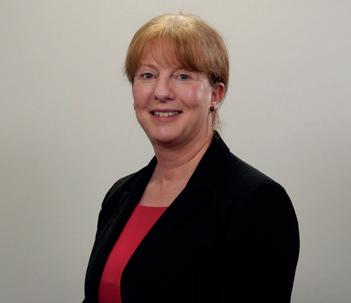

In our Budget submission we have called on the Scottish Government to demonstrate its support for Scotland’s farmers and crofters in the forthcoming 2025/26 Scottish Budget by:
• Increasing in funding for farming and crofting in the 2025/26 Budget, given the increase to the block grant
• Delivering the full rollover of £620 million baselined in the block grant in the 2025/26
• Repeating the Scottish Government’s annual contribution of some £60 million in the 2025/26 Budget
• Adding a further £50 million, given the 8 percent increase in the block grant then applied to the £620 million rollover
• Explicitly returning the outstanding £46 million of uncommitted funds to the 2025/26 Budget
• Ring-fencing support for farming on crofting within the Scottish budget
• Committing to multi-annual funding for farming and crofting within successive Scottish budgets
In total, that equates to £776 million for farming and crofting in the 2025/26 Scottish Budget.
We have to recognise that there is

pressure on the overall Scottish Budget. However, with the significant uplift in the block grant, we strongly call for the Scottish Government to demonstrate its support for the sector. Our Budget submission demonstrates that any reduction in the Scottish Government’s support for farming and crofting would negatively impact food security, environment and nature recovery, economic activity and growth.
If the Scottish Government wants to secure high-quality food production and the upstream and downstream socioeconomic multipliers that are critical to wider rural prosperity across Scotland, our budget must be increased in real and nominal terms.
That increase would ensure the continued delivery of the significant return on investment for the Scottish Government, generate more growth and employment (in areas of Scotland that have little alternative employment), and deliver the climate and nature outcomes that are vital to all our futures.
The public interests embedded in sustainable food production, tackling climate change, enhancing biodiversity and underpinning vibrant rural communities cannot be understated or overlooked.
In short, the Scottish Government’s 2025/26 Budget must provide the fuel to drive all the clear objectives and ambitions in the Scottish Government’s flagship Agriculture and Rural Communities (Scotland) Act 2024.
Scotland’s farmers and crofters cannot deliver what is being asked of them, in the wider interests of us all, without the financial backing which is now the sole responsibility of the Scottish Government.
(We will report on the Scottish Government Budget in the next issue of Scottish Farming Leader.)


Scottish Machinery Rings are working in partnership with Case IH dealers to provide an exclusive rebate for members on their latest machines including the RB HD Pro Variable Chamber Series.
These balers are the perfect all-rounders. With a heavy duty design, these balers rely on a robust drive line and premium material for maximum lifetime and minimum downtime. The choice is yours with two models to produce bales up to 165 or 190cm, and RotorFeeder or RotorCutter options with 13 or 25 knives.




AYRSHIRE




REGIONAL MANAGER Mhairi Dawson
07718 425 053
mhairi.dawson @nfus.org.uk




REGIONAL MANAGER
Sheena Foster
07789 796 582
sheena.foster @nfus.org.uk



Following the success of last year’s Family Day, we were thrilled to host another event at the MacRoberts Farming and Rural Skills Centre at Dumfries House. The day kicked off with an inspiring presentation from Alex Reynolds, the Farming and Rural Skills Curriculum Manager, who welcomed everyone and provided an insightful overview of the facility. He highlighted how the centre is being utilised to offer practical training for students
The formal consultation is open until 14 Feb. ALL proposed boundaries include South and East Ayrshire. Please see the Dumfries and Galloway regional update (page 58) for more information.




REGIONAL POLICY
01856 872 048 john_laughton @nfus.org.uk
As always anything that you think NFU Scotland can be of assistance to you please get in touch.
aspiring to build careers in the rural sector, as well as for those already working in the industry.
NFUS Dairy Policy Manager, Tracey Roan joined Regional Managers, Sheena and Mhairi alongside Jane Cameron, Ayrshire & Arran RHET co-ordinator.
This was another well attended day with members getting the opportunity to explore the new training centre and Valentines Farm which was a highlight for many of the ‘mini’ members attending.
Members of the Kilmarnock and Ayrshire North branches were recently well entertained at an excellent meeting with Michael Shannon, owner of Damn Delicious, who gave a very informative talk about his farm, butchery and farm shop at Camp Farm Thankerton.

Although geographically distant from the powers-that-be at both Westminster and Holyrood, Orkney has been wellrepresented at the rally in London. Our Orkney Branch Chair Colin Flett, along with Regional Chair Cecil Eunson, made the long trip down to
London to join the thousands of fellow farmers and producers to demonstrate the industry’s concerns in light of the Labour budget. Changes to IHT APR, the tax treatment of double-cab pick-ups, the increase in NIC and the proposed carbon tax on imports of fertiliser, steel, aluminium etc. have far-reaching




REGIONAL MANAGER
Sheena Foster
07789 796 582
sheena.foster
@nfus.org.uk

The Greater Glasgow Partnership Against Rural Crime (GGPARC) held an event at Pollock Country Park, Glasgow to promote responsible dog ownership. At this event a ‘Keep your dog on a lead’ poster competition was launched encouraging schools across Glasgow to take part. There were a great number of entries with the winner coming from St Teresa’s Primary, Glasgow. PC Fiona Drummond and I presented the winner with an annual pass kindly donated by the Museum of Rural Life, East Kilbride. This fabulous entry will now be printed and displayed in parks across Glasgow.

Members from the Bearsden offi ce headed into East Central territory for a fantastic and informative visit to Gloagburn Farm Shop at Tibbermore near Perth.
Members were given an insight to the farm shop and coff ee shop business by owner, Ian Niven before moving outdoors to see fi rsthand the farming practices which the Niven family undertake to grow their business.
Members of NFUS and Lanark NFU Mutual office recently had a day out to the Tup Sales at Lanark Market to provide members an opportunity to engage with any issues or concerns and to highlight the benefi ts of being an NFU Scotland member.

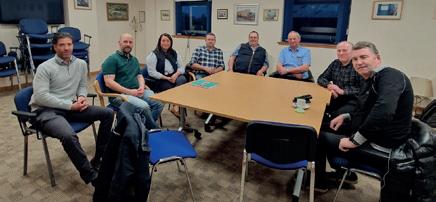
Following the announcement of changes to Inheritance tax, South of Scotland MSP, Brian Whittle met with members across South Lanarkshire and East Ayrshire to discuss the impacts this will have on local family businesses and the industry.
repercussions for all producers the length and breadth of the country and it is important that we stand together as an industry and Orkney is represented, despite its remote location. The fact that over 300 farmers congregated for a rally at Orkney Auction Mart on the same day as the London rally demonstrates the fact that there is a deep-rooted concern that the farming industry is being unfairly targeted by the Westminster administration. Focus now turns to the rally at Holyrood ahead of the Scottish Budget on 4 December. Again, Orkney will be well-represented with six NFU Scotland representatives making the trip down to Edinburgh to ensure that our voices are heard both as an industry but also as an island group and that it is imperative that both the sector and Orkney get a fair deal.


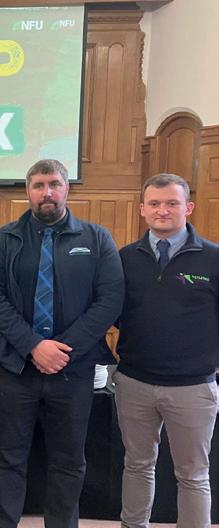
LOTHIAN AND BORDERS




REGIONAL MANAGER
Lindsay Brown
07780 441 750
lindsay.brown@nfus.org.uk
In October we held the fi rst onfarm Combinable Crops meeting in a while. Alistair Stewart hosted us at Sandyknowe Farm, Kelso. John Flanagan, Crops policy manager joined us for the meeting, keen to get out and meet members face-to-face. Following the meeting and discussion, we took the opportunity to look at Alistair’s new grain handling and storage shed.




There was a full house at this meeting with a presentation from the Gala office team highlighting ‘how to avoid the common errors made’. It was good to see so many different people who were keen to find out more.
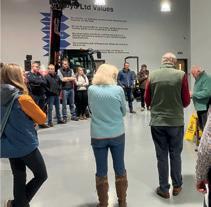



Consultation is open for the Proposed National Park in Galloway and S. & E. Ayrshire
DUMFRIES & GALLOWAY




REGIONAL MANAGER
Mhairi
Dawson
07718 425 053
mhairi.dawson @nfus.org.uk
The formal consultation for the proposed Galloway (and Ayrshire) National Park is open and runs until 14 February. You will find the consultation and other information including dates/times for local consultation events at https://newnationalparkgalloway. commonplace.is/.
For those who have not done so before, or who wish to refresh their minds before filling in the consultation, the bid submitted by the Galloway National Park Association (GNPA) can be found at https://www. gallowaynationalpark.org/bid. The GNPA website also has additional information, however, it is important to note that it is Scottish Government, not GNPA, who would make any decisions on the budget, boundary, planning powers, governance etc., should designation go head.
We acknowledge that there are members who support
Two joint meetings of the Lothian branches were held at the Stair Arms and Livingston Rugby Clubs. Both meetings were well attended by members who all wanted to hear from the staff at Gala and ask questions. Supper was enjoyed by all. Thank you to all the RPID staff who gave up their time to present. Their key message is that they are approachable so just pick up the phone and ask any questions you may have.
There was an excellent turnout of members, both young and old, who came to have a look around the Lloyd Ltd site at Kelso, which has undergone considerable investment over the last four years. The AGM was held first in the reception area prior to the tour through the building and out to the machinery sheds which were huge. Lloyds have made sure that their investment is future proof for growth and provides a good workplace environment.

the bid and some who are undecided, however, the majority of members across D&G and Ayrshire who have spoken with us, do not support it. On 30 October, we gave evidence to the Citizens Participation and Public Petitions Committee in Scottish Parliament to that effect. We outlined that the four national park aims can be delivered by the new Scottish Agriculture and Rural Affair Acts and by existing bodies (for example, the Galloway and Southern Ayrshire Biosphere and South of Scotland Enterprise), without the need for a further layer of bureaucracy. That the division that has been caused by this process is significant and should not be underestimated. And finally, whilst we enjoy a very good working relationship with NatureScot, our membership is concerned at their lack of impartiality as a reporter on this project. Please engage with the consultation individually, and ensure your voice as a Galloway or Ayrshire resident, is recorded.










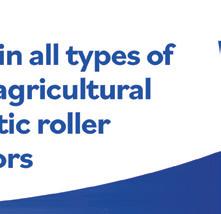






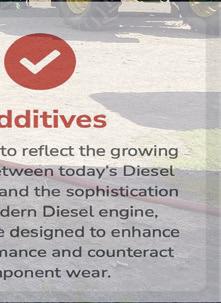













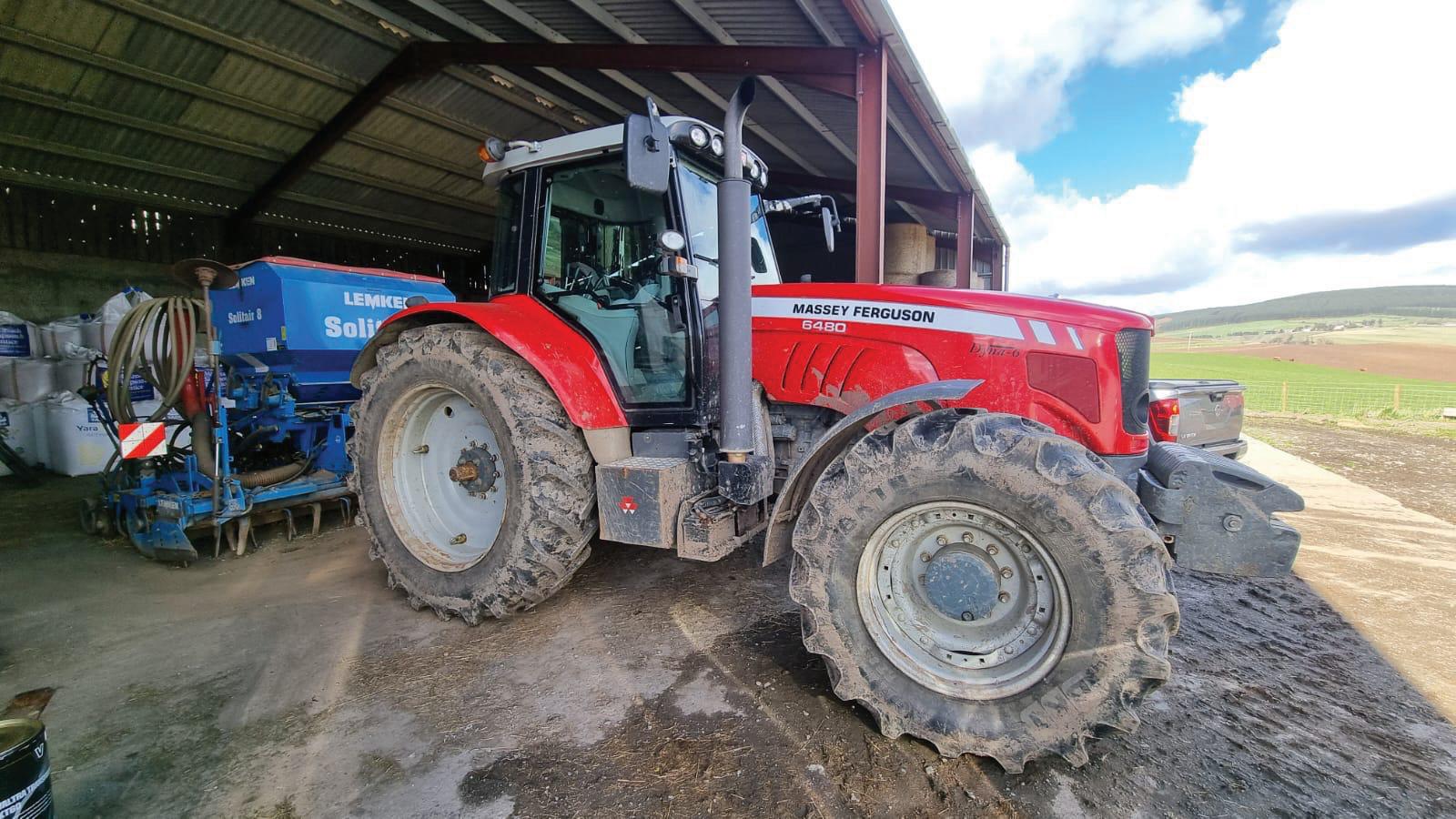













Lee Smith
07554 741 030
lee.smith@nfus.org.uk
The new tier system announced by the Scottish Government has raised concerns among crofters and farmers in Shetland. With changes set to take eff ect in May 2025, crofters are contemplating how these adjustments will impact their livelihoods and traditional crofting practices. Some are seeking to diversify and explore new opportunities that benefi t both the environment and their businesses.
As an example, a few crofters and farmers in the South Mainland, including Laura Sinclair and myself, have been

collaborating with the RSPB on the ‘Species on the Edge’ scheme. This initiative aims to halt the decline of the Twite (Linaria fl avirostris), primarily caused by habitat loss due to human land use changes.
On a carefully selected site, we’ve been trialling the use of a specially designed seed mix for Shetland, known as a bumble bird mix, that helps support pollinators during the summer and provides food for the Twite and other birds in the winter. The results have been remarkable—a vibrant sea of colour with




07919 001 23 kate.maitland@nfus.org.uk
Merry Christmas to you all. Wishing you all a very happy one. Hopefully an opportunity to down tools and spend some well-earned time with family and friends. Branch AGMs are in full swing and the Regional AGM will take place on Wednesday 8 January prior to the Regional Hustings event. We have been extremely fortunate to have the President living in the area, a great credit to the region. Martin has worked his way up from grassroots representing the Branch as Chair, then Less Favoured Area (LFA) Representative for the region and finally LFA Chair before taking on the VicePresident role. There are many words to describe Martin, determined, loyal, kind-hearted and committed, jump out to me the most. I would like to take this
the gentle hum of pollinators and hint of honey scent. Over the summer, the crop thrived and has now died back, revealing pods that the Twite can access for seeds.
Laura said, “Although this is just a pilot scheme, I feel it’s a good way for crofters to expand knowledge and gather evidence of the benefi ts of agrienvironmental schemes. I hope that this initiative, that’s been inspired and driven from the ground up by the people who have the experience, knowledge and practical skills with the backing of key stakeholders such as RSPB and NatureScot, is one of many that will positively infl uence and shape future policy decisions.”

opportunity to thank Martin immensely for all his years of commitment and on behalf of the region I would like to wish him all the very best in years to come. Please don’t be a stranger.
If you wish to become more interested in the Union, please do make contact and find out more. We are very much trying to embrace all forms of communications whether online, face-to-face or social media. Emails and mobile numbers are key so if you have a chance, please do let me know what they are.
Open meeting on ‘The Consequences
of the UK Budget’ well attended by concerned members.
We gave members the opportunity to hear first-hand from NFUS service providers Gillespie McAndrew and Johnston Carmichael alongside NFU Mutual Financial Advisors. Topics covered included Inheritance Tax, Capital Gains Tax, National Insurance, Impact on Pensions and Life Insurance. Please make use of the membership services we provide as part of your membership. Contact numbers can be found in your handbook or please contact me direct.





REGIONAL MANAGER
Lorna Paterson 07786 860 453
lorna.paterson @nfus.org.uk
About 10 local members paid their own way to attend the London Rally, loaded up with lorne sausage and haggis supplied by Graeme Barber Butcher, Alford. Alison Skinner diligently decorated and wrapped up the food packages with tartan ribbons so that our members could take the Scottish theme down to London and deliver to the Foodbank charity.
We’re currently arranging the coach trip to our Holyrood Rally as I write. Thank you to our anonymous farmer donor from New Deer branch as well as the Thainstone Agency for sponsoring the coach hire costs. Also, to the anonymous Buchan farmer who is sponsoring the complimentary bacon rolls & teas & coffees en-route down to Edinburgh.
Dee Don Branch Chair, Andy Smith and Secretary, Tommy Brodie arranged a surgery with Alex Burnett MSP to discuss various issues, including flooding and LFA support. It is always great to see members taking the initiative and doing things which are deemed to be important for our wider grassroots members.

Laurencekirk Group Secretary, Andy Mackle, arranged an excellent combined Stonehaven-Banchory and Laurencekirk Branch event at Balmekewan in November.

Our Regional Chair, Kevin Gilbert kindly hosted a speedily organised MP meeting for members in his cattle court on a freezing Friday morning. The key objective was to ensure members’ opinions on the UK Government budget were heard loud and clear. Our MPs are all completely understanding of our views and will try to lobby hard within Westminster for a rethink.























REGIONAL MANAGER
Lucy Sumsion
07787 434 104
lucy.sumsion @nfus.org.uk



The Minister for Agriculture and Connectivity, Jim Fairlie MSP visited Argyll to meet with David Colthart, Achnacone, Appin, along with representatives from NatureScot and Scottish Government. David, who chairs the Argyll and Lochaber Sea Eagle Stakeholder Group, had the opportunity to outline the impacts that Sea Eagles are having on his hefted sheep fl ock and on other farmers and crofters in the region. With everincreasing numbers of Sea Eagles establishing territories in the west and Highlands, and increasing numbers of applicants, we used the meeting to highlight to the Minister how we need an increased budget for the Sea Eagle Management Scheme and the necessity for multi-year funding.





REGIONAL MANAGER
Ian Wilson
07775 915 988
ian.wilson @nfus.org.uk

The weather has been against many of us since October 2023 starting with floods followed by a wet winter. Spring work getting arable crops in was a struggle and it was as late a sowing as many can remember. Lambing weather was poor and challenging but as usual we got through it. Then we got a couple of weeks of exceptional growth before more broken weather all summer right through into harvest. The grain prices took a slump in the run up to harvest to compound the challenges of getting harvest completed. Store lambs and calves saw good returns which feel good for sellers but is all needed in these days of high costs. Finished lambs peaked at new highs in the late spring and remained strong through much of the summer months with finished cattle prices hitting new highs.

Members of the Argyll & the Islands Regional Board recently met with MSPs Jenni Minto (SNP) and Tim Eagle (Conservative). Held in Dalmally on 8 November the meeting gave Board members the opportunity to emphasise how critical the Agricultural Budget is to farmers and crofters in this region. Issues around the proposed Land Reform Bill and the ferry service were also discussed.
The Argyll and the Islands AGM will be held from 11am on 10 January prior to the Hustings. The AGM will be followed by the presentation of the A&I Stalwart Award and a buffet lunch. All members are very welcome to attend.
Do you know someone who is a NFU Scotland member who you consider has signifi cantly given their time and eff ort to the work of the Union in Argyll and the Islands region? Or do you know someone who has made a considerable contribution to agriculture in the area?
Nominations are now being sought for the 2025 winner of the Argyll & the Islands Stalwart Award. The award will be presented at the Regional Board AGM held on 10 January 2025 at The Gather, Campbeltown Road, Tarbert. If you would like to nominate someone for the award, please contact your local Branch Secretary or myself.
Some would think all was well in farming but then a new Government was elected with promises of understanding the needs for farmers and food production, and recognising the importance of food and farming to the whole country. Yet their Budget on 30 October didn’t show that support or understanding!
Locally NFU Scotland has had a busy year trying desperately to educate many who sit within the wider rural sector about the devasting impact beaver translocations have on farming communities. There’s also been much time invested on the issue of rewilding and amongst other things the affect it has on fire fuel loads. There’s an ever-increasing likelihood of large wildfires in these areas but this does not seem to slow down the poor thought processes and lack of responsibility for the danger to the wider area and their neighbours. At the UK wildfire conference much was made by overseas speakers about the need to control vegetation/fuel loads before it’s too late. Grazing livestock and having controlled burns were promoted as the easiest and best way of maintaining control. Something for some ‘experts’ to think about.
As always, anything that you think NFU Scotland can be of assistance to you with, please get in touch.






•
•
• Exports
•
•
• Dentistry








































